Knocking Down Barriers
Elite Boxing Sisters Abiola and Alesha Jackman are making history and proving that strength knows no gender


Sunday, March 9, 2025

Elite Boxing Sisters Abiola and Alesha Jackman are making history and proving that strength knows no gender


Sunday, March 9, 2025
KAHLAWATTIE Tulapersaud never believed in taking handouts or sitting around idly. From a young age, she developed the right mindset to become empowered, using her natural skills to become a farmer and a woman who is good with her hands—always finding ways to earn.
She has utilised every available space in her yard to cultivate vegetables such as sweet peppers, bird pepper, pak choi, fine thyme, married man pork, celery, squash, banana, carilla, boulanger, shallot, sweet corn, cassava, papaya, plantain, seasoning pepper, among others.
When the Pepperpot Magazine visited, Tulapersaud, also known as Lynette or Baby, had just
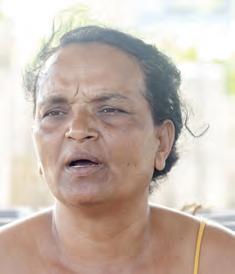
Tulapersaud told the Pepperpot Magazine that she and her husband do various jobs, including travelling some distance to the canal to throw cast nets for tilapia fishing and picking dry coconuts to sell at an estate.
The 48-year-old also rears meat birds, which she sells right in the village.
picked a bunch of bananas, which she had hung under her steps to ripen.
Sh e explained that while she sells some of her produce to wholesale buyers—who often pay very little—she also frequently gives away vegetables and fruits to neighbours and passersby when she has a bountiful harvest.
Three years ago, she started using the space in her yard to cultivate crops from seeds and plants she purchased, all as a means to earn.
A mother of four and grandmother of eight, Tulapersaud explained that she is independent and refuses to let her spouse shoulder all their financial responsibilities alone. She does whatever she can to


contribute to the household income.
Her mother, Liloutie Lilawattie, known as Pillow, recently passed away at the age of 67, and Tulapersaud was actively assisting with the funeral arrangements at the time of the interview. Her mother had lived a few houses away with other relatives.
A mild-mannered

doesn’t have to be like that. Even if someone needs something and they don’t have money, they just have to ask, and I will give it for free,” she said.
At 62 years old, age is just a number for Radica Thuknauth, who has been actively walking to sell trendy clothing to the public for the past 22 years.
She started this trade when she received barrels of clothes from overseas to sell. Later, she began buying locally sourced clothing and even travelled to Suriname to purchase clothes for resale in Guyana.
Thuknauth explained that her husband, Hemchand Dooknauth, 64, also sold clothes the same way when he was em -
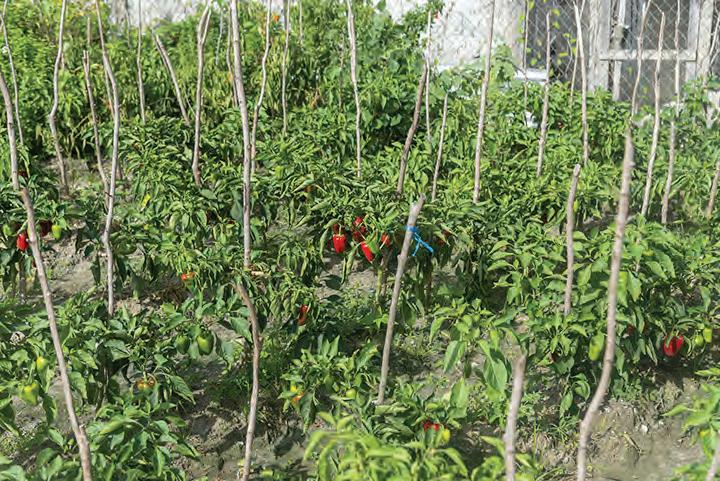
woman, Tulapersaud pointed out that when her husband is around, they visit a large coconut estate at Unity, East Coast Demerara, to pick dry coconuts, which they sell to wholesale buyers.
“We are big people, and we never wanted to work for others, so we do all kinds of work to earn and be independent, honestly,” she said.
She also shared that theft is a common problem. “People would often steal my produce, but it
for their household.
A mother of three, she described how she visits hospitals, police stations, shops, and nearby villages to sell clothes. Over the years, she has become well known as the "Indian clothes lady," a business that enabled her to raise her three children, provide for their needs, and send them to school.
“Raising three children is no easy task. You have to spend money. You have to make sure they have what they need, and walking to sell clothes empowered me to earn an everyday dollar,” she said.
On the day the Pepperpot Magazine visited her community, it was her birthday. She was thrilled to have reached another milestone, and her only daughter had planned to take her out for dinner, showering her with gifts.
A hardworking woman, Thuknauth also tends to a kitchen garden in her yard and takes care of general household chores, including cooking daily meals.
Her home and yard are impeccably tidy, and she enjoys spending
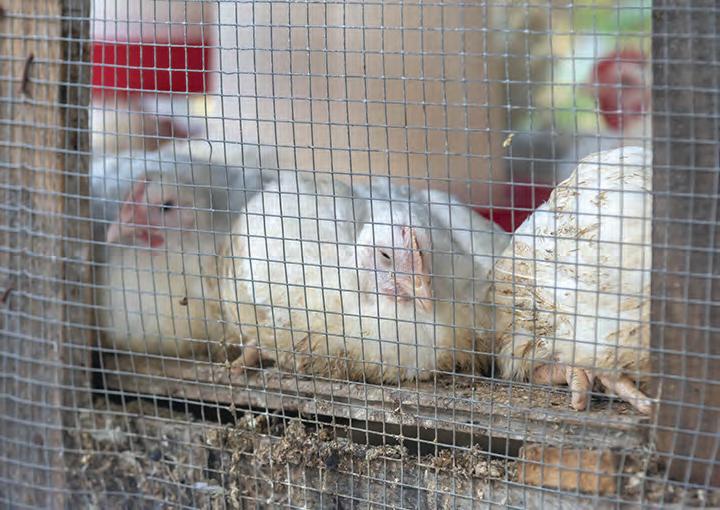
her free time with her grandchildren, who often visit.
By Shaniya Harding
FOR more than three decades, Dawn Gordon has worked at the bustling Stabroek Market, vending small goods to earn a living. A mother of six, one of whom is disabled, Dawn has weathered immense struggles—from losing her husband to raising a family single-handedly. Yet, despite the hardships, she remains steadfast, a woman refusing to surrender to life’s challenges.
Dawn’s journey into motherhood was anything but easy. She recalls how, after working at a soap
factory, she was forced to leave when the company shut down. It was then that she turned to vending, starting small by selling biscuits at the market gate before gradually expanding her business. Recounting her experience, she stated, “There were days when it was difficult, but there were days when you could smile. But as years go by, things become difficult. The money that you used to generate in the years before, you can't generate it now,” she shared.
Raising six children without a stable income meant sacrifices. Dawn’s
husband had passed, leaving her to play both mother and father. She ensured her children went to school, each attending different institutions across the country, while she worked tirelessly in the market to provide for them. “I had to start playing the role of a mother and a father in my children’s lives; the struggle was on again,” she shared.
Even after her children grew older, she continued to push forward. Her days started early, sometimes as early as 7 a.m., gathering goods, setting up her stall, and preparing for long hours of selling. But in
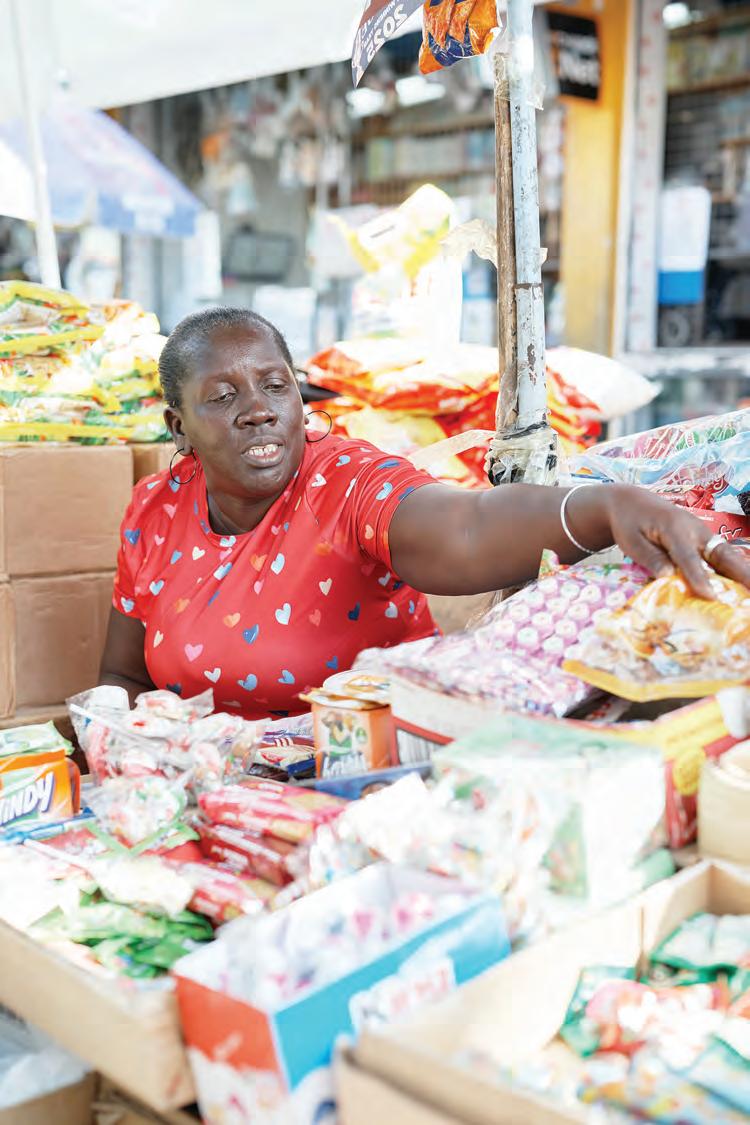
recent years, business has changed. “The business is not like how it was years ago; too much competition. We still have a few customers, but the sales have slowed down a lot,” she stated.
Despite the financial strain, Dawn never gave up on her children. She believes that survival is about perseverance, even when circumstances seem bleak. “As a woman, parents tell you, do not give up. Don't give up. Life ain't no easy. Life is where you make it. You gotta fight to make it something,” she stated. This motto has been her motivation for years, particularly when it came to balancing a demanding job and a large family.
Among the six children Dawn raised, one requires her constant attention. Her 21-year-old daughter has a severe disability that has left her unable to care for herself. Miraculously, despite this, Dawn remains optimistic. She shared, “My daughter was born disabled and can't do nothing for herself. But nevertheless, I didn’t give up. I continue to do what I have to do as a mother,” she stated.
One of the reasons Dawn remains so optimistic is the overwhelming support she receives from her children. With her daughter needing special attention, each one of Dawn’s other children takes up the mantle of caring for their sister. This close-knit family connection is the reason Dawn was able to persevere. “The children play a great role in assisting me with her. They help me a lot. The people I work with, they all help me,” she stated.
Despite the emotional and physical toll, Dawn remains steadfast. She urges other mothers in similar situations to seek support and not lose hope. “I would tell any parents that may be in a position like me, who have a child that is disabled, don’t give up. Don’t give up. Keep fighting,” she encouraged during her talk with Pepperpot Magazine.
While motherhood and caregiving have tested Dawn’s strength, the battle
to keep her small business afloat has been just as challenging. The economy has shifted, competition has grown, and making a profit is harder than ever. “When I came here in 1992, we used to throw $200 a day in the box, and still, $200 a day
So, a place where businesses like mine could get a loan would be very good.”
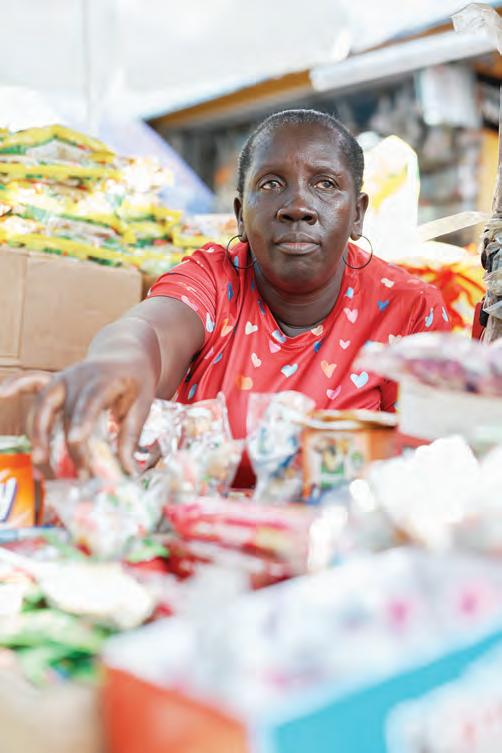
used to make good money.
But now, you say $4,000, you can't even buy something,” she stated.
Over the decades she has worked, Dawn has made massive strides— putting her children through school and building a home of her own in the village of Pouderoyen. Like so many informal vendors, she lacks some necessary documentation to access small business loans, leaving her with limited options for growth. Now, looking toward retirement, Dawn would like to see more business opportunities for small-time vendors like herself. “I would like to do something else after this. I want to do something with a loan. Small Business Bureau. But I heard you have a lot of things you require.
As she reflects on her journey, Dawn acknowledges the struggles but remains grateful for the strength she has developed along the way. “Sometimes, I used to say I would regret it. But then, at the end of the day, when I look at it, I say, God gave me a choice and I had to make a decision. It was hard, but I don’t regret my choice,” she stated.
Dawn Gordon has endured loss, poverty, and the daily struggles of raising a family with little to no support. But through it all, she has held her head high, continuing to fight for her children, her business, and herself. Today, Dawn says she is ready to retire and spend time with her children and grandchildren. Her story, like so many women in Guyana and beyond, highlights hardship, survival, strength, and the enduring spirit of women who refuse to give up.
By Shaniya Harding
EVERY year, Guyana joins the rest of the world in celebrating International Women’s Day and this week, the Pepperpot Magazine ventured to Stabroek Market to gain a better perspective on the strength, stories and perseverance of the everyday Guyanese woman.
Beneath the iconic Stabroek Market
Clock, Natasha Ramlal begins her day at 7 a.m. sharp. A market vendor since her teenage
years, the 33-year-old is a well-known name in Stabroek. Having sold fabric for the past 17 years, Natasha has become an expert in the trade. But behind her effortless craft is a story of resilience— one stitched together through struggle, single motherhood, and an unyielding determination to stand on her own.
Seated amid the hustle and bustle of the marketplace, Natasha shared that she grew up in Number 2 Canal on the West Bank of Demerara as the eldest
of six children. With three brothers and two sisters, responsibility came early. “I was t he eldest daughter, so I started mothering from small,” she shared during her interview with Pepperpot.
That sense of duty carried Natasha into her teenage years and into motherhood. At just 16, she met the man who would become her husband. Married young, she started a family, eventually having three children—now aged 14, 13, and 9.
But as the years

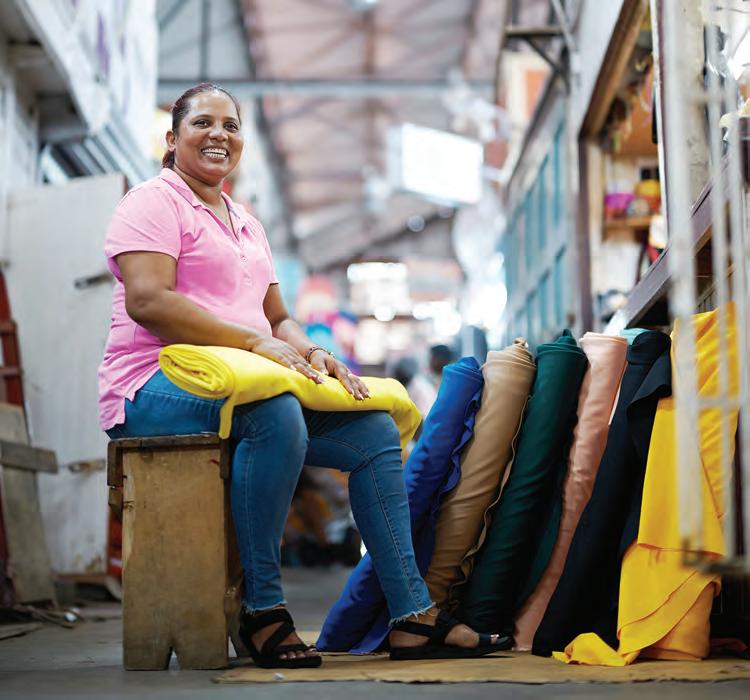
passed, the relationship fell apart. “At the age of 27, I got separated. My husband was working in the interior, and I found out he was unfaithful. He made a child outside of our marriage,” she revealed. The betrayal was devastating, not just emotionally but financially. As a young mother who had depended on her husband’s income, she suddenly found herself solely responsible for her children.
Having worked in the market before marriage, Natasha decided to return to what she knew best. “I used to work at the market before, but then I stopped after I got married. After I had my three kids a nd we separated, I said, ‘You better come back to work,’” she recalled.
Being a single mother was not easy. The weight of responsibility was overwhelming. “For a while, I was a single mom. It was
hard—sending the children to school and then h aving to come here and work,” she admitted. The stress took a toll, and in her lowest moments, she turned to alcohol to cope. “It was stressful. I got depression. I couldn’t concentrate. And I started drinking and drinking, getting drunk, drunk, drunk,” she shared.
But even in her darkest moments, her children remained her priority. Determined to turn her life around, and with the support of her now-partner, Natasha overcame her struggles. “I sat down one day and said, ‘Tasha, this is not for you.’ And that’s when I met the person I’m with now, and they helped me. Now, I don’t drink,” she said.
For Natasha, returning to Stabroek Market was more than just a job—it was a path to survival and independence. “Everything happened here,” she reflected. “I started work-
ing at 16. I stopped, and then I came back. So I’ve been in this market all the time.” Selling fabric became her way of rebuilding her life. “We sell mostly fabrics—chair material, sofa material, African prints,” she explained. “A guy brings them in from different parts of the world, and we buy from him.”
Even though she has spent years in the business, she acknowledges that the market is not what it used to be. “When I first came here, the market was bright. The market was good. But now, this is how it is—day by day, it’s different.” Still, she remains steadfast. “Doing this work now is simple for me. Maybe because I’ve been here long, but it would be hard for somebody new to come in and try to do it,” she noted. Her work not only supports her family but also gives her purpose. “When you have six
By Michel Outridge
WITH a simple phone call away, you can relax your tired body and get pampered evenly at Body Relaxation, a massage, spa and salon operated by a specialist who is equally qualified and certified to make you relax, rejuvenate and recharge.
Samantha Thaknauth is the owner of Body Relaxation, a massage, spa, and salon located in Huntley, Mahaicony, East Coast Demerara. She specialises in therapeutic massages, which include hot stones, deep tissue, aromatherapy, and sports injuries.
She also does manicures, pedicures, body waxing, body scrubs, hair and scalp treatments, facials, hair cutting and colouring.
The 42-year-old established her small business 10 years ago when she started doing home service massages for customers.
Thaknauth told the Pepperpot Magazine that she used to work at a home spa business in the city, and during her spare time, she would take up jobs to go to people’s homes and do massages.
She added that she stopped doing home services when she constructed her very own shop, which caters to massages, hair, nails, facials, body scrubs, and
waxing.
Thaknauth said that from 2006 to 2008, she worked in Turks and Caicos at a hotel as a massage therapist, and one day, she saw a girl in her van with a massage table doing massages on a client, and that inspired her to establish her own small business in that field.
She added that she returned to Guyana, and when she saw they had massage courses available, she registered for one to become certified.
The married businesswoman explained that she received training at Mercy Hospital from a Swedish massage specialist called Sister Rose from 2009 to 2010, and she underwent three other massage courses.
Thaknauth reported that she was among 40 students at the time, and they had two batches of learners. She was elated to learn that she had topped her class in the course.
Thaknauth pointed out that both her grandparents were gifted as natural masseurs, better known as the ‘rub man and woman.’ Even though they did not attend any formal training, they were the ‘go-to’ persons in the community whenever villagers had pains and other muscle issues, and they would make them better
“I knew I had it in my

genes, a gift, with my hands to help people via massages, and I worked towards becoming qualified and certified in the field so people will not have questions about my practice. I also did three online courses to become marketable,” she said.
Thaknauth specialises in Swedish massages, trigger point therapy, and acupuncture, and she stated that she can fix muscle and tissue pains but cannot do anything for sciatic, nerve and bone
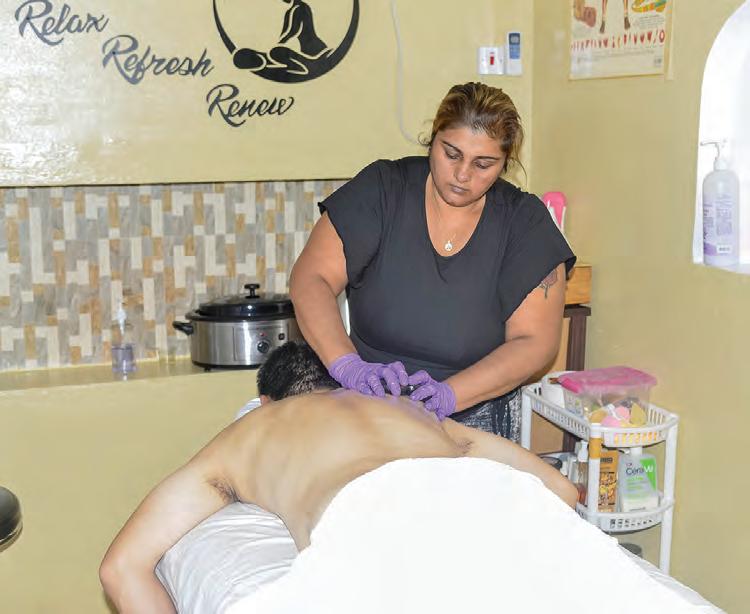
issues, which require professional medical intervention.
The massage therapist pointed out that instead of popping pills (medication), she can help people to heal naturally via her different types of massages and recommends a massage once every month or three months to soothe the body.
Thaknauth reported that she does moon baths, massages, body scrubs, manicures, pedicures, facials, and hair services such as cutting, hair treatments and
colouring.
“A simple haircut can make a big difference once it is structured to suit the customer’s facial features and styled to match. It can make you feel younger, better, and more confident,” she said.
She stated that for any massages, the customer has to fill out a form with the relevant information and affix their signature to protect them both, and that is the way forward in the event of any issues.
“Sometimes customers
come in limping or holding their back with terrible pains, and you can see the difference in them after they walk out of here, and that brings me real joy to see that I can help people feel and look better,” she explained.
Thaknauth isn’t indifferent about medical intervention, but she is certain that massages do have benefits for the body.
“For me, this job isn’t about the money, but yet I keep my prices within affordability so people can come and benefit from the various services offered, and this is what I love doing, helping others,” she said.
Thaknauth added that at times, she knows that some people really need the services but they are short on cash, and she would give them a discount so they can get what they came for and leave happy and relieved, all at the same time.
The massage therapist/ beautician told the Pepperpot Magazine that it is her way of contributing to society. Even though she cannot give charity all the time, she would have promotions and give discounts to customers.
It is to be noted that when doing massages, the customers have full privacy, and there are no other customers in the space at the time. She works based on appointments on a daily basis.
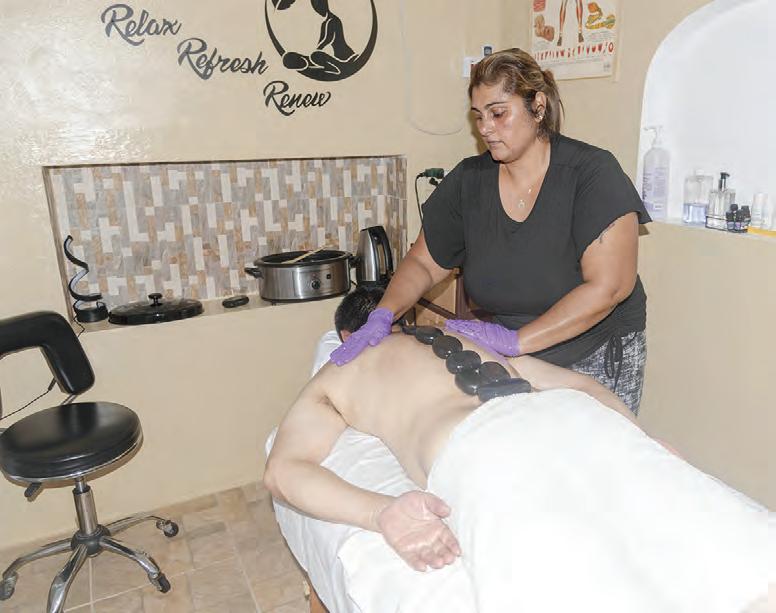
By Shaniya Harding
IN a sport long dominated by men and characterised by raw dedication and strength, sisters Abiola and Alesha Jackman have carved their names into Guyana’s boxing history. Growing up in East Ruimveldt, their journey was anything but easy, yet their unwavering grit and passion for the sport have propelled them onto the world stage, earning them the title of Guyana’s first IBA-ranked female boxers. With strength, discipline, and ambition, the sisters continue to overcome the odds in and out of the ring. As they dominate in the heavyweight division both regionally and internationally, the sisters represent more than just boxing—they defy expectations and prove that, with dedication and drive, some barriers can be knocked out. FROM HUMBLE BEGINNINGS TO THE
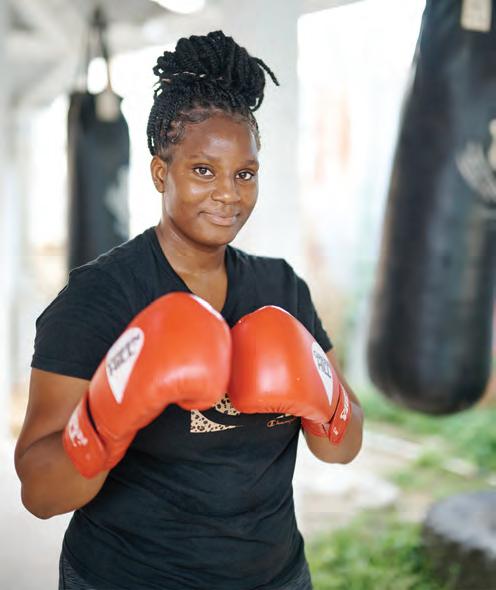
shared, “Growing up for us wasn't anything easy or nice. We grew up in a place called East Ruimveldt. It was not easy if you didn’t
into Boxing, gaining an interest in the sport when she was just 11 years old. As she explained, her love for Boxing was sparked by
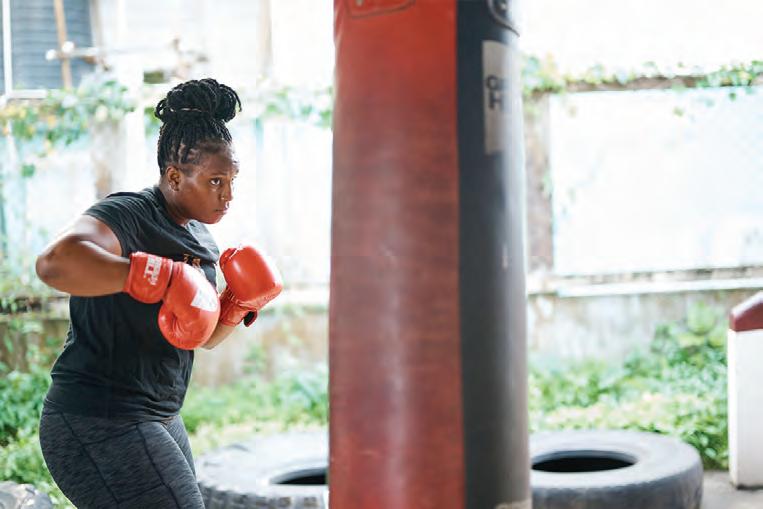
inations.’ It was my cousin that motivated me to start Boxing. Then my sister came along a year or two later after,” she stated.
Now 22 years old, Abiola followed in her sister’s footsteps, driven by curiosity and the competitive spirit that runs in their family. As she shared, “Well, my sister started boxing first, and one afternoon, I left school and went to the gym to see what my sister was doing. When I saw the coach, I told him I would be coming to train the next day. And the next day I put on my gear and started Boxing.”
Although Boxing seemed to run in the family, not all of their relatives were keen on them taking up the sport. Older sister Abiola shared that her uncle initially did not want her to box and tried very hard to stop her from attending the gym. But remaining true to herself, she defied her family and would later defy expectations.
“Well, I have an uncle. When I first started in the gym, he didn’t want me to go. I got licks to stay away from the gym, but I was so determined, I kept going to the gym and took my licks—and look where I am today,” she stated.
YOU CAN’T PLAY BOXING: CHALLENGES AND TRIUMPHS IN THE RING
A lthough the sisters have been Boxing since childhood, they explain that the work that goes into Boxing never gets easier and requires great dedication. As Alesha put it, “Boxing, in general, is a really difficult sport. You can play every other sport, but you don’t play Boxing.”
Abiola and Alesha Jackman, in many ways, represent the unique fighting spirit of Guyana. Born and raised in East Ruimveldt, the duo faced numerous challenges growing up. Recounting their early years, younger sister Alesha
have your head on or proper parenting,” she told Pepperpot Magazine. Boxing, however, was not something they initially sought out, but it became their avenue for growth and resilience. Twenty-yearold Alesha was the first of the sisters to take the step
seeing her older cousin in the ring.
“I was a sports person. I was in football growing up. And I had a cousin that used to box. Seeing him come into the gym, I told the coach, ‘I want to join the boxing gym after I finish writing my exam-
than just sparring at the gym a few times a week. It involves hours of perfecting technique, maintaining a diet, a specific weight, and even mental preparation.
As a heavyweight boxer, Abiola has worked hard to perfect her technique, working with lighter boxers to develop her speed and agility in the ring.
“My coach gave me a lot of light boxers to work with, so they can touch me and make me move a lot. That’s where I gained my skills and technique—from the light boxers in the gym. I have to move from those punches,” she shared.
Although they didn’ t win in India, it was a big step. Most recently, Abiola represented Guyana at the Caribbean Championships in St. Lucia, where she dominated the competition and earned Guyana the Best Female Boxer title.
This, she says, was among her proudest and most memorable moments in her career.
“It was a great tournament for me because the girl I fought, Angel George, I fought her last month in Trinidad and Tobago. She’s a great fighter. I can't take that away from her. When I fought her in Trinidad, I
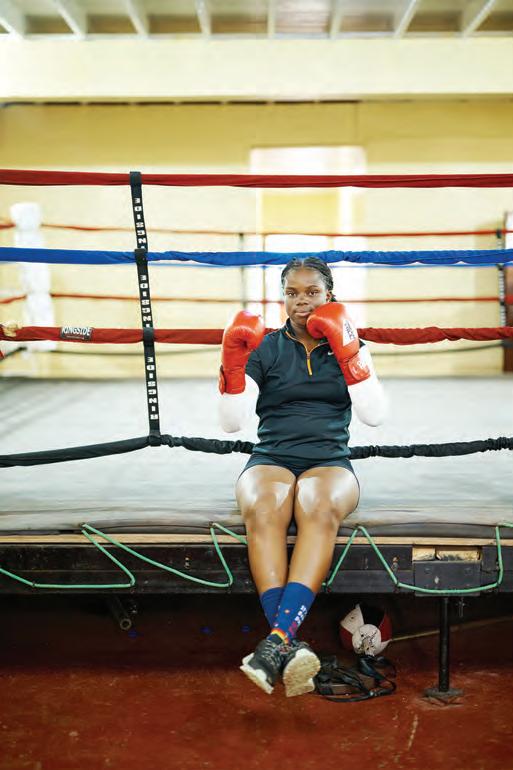
She further added, “You’ve got to stick to your diet, stick to training, and enter the competition at the right weight—neither under nor over.” This dedication has allowed Alesha to compete and represent Guyana in various regional and international competitions.
Abiola shared that preparing for a fight is more
The sisters’ devoted training paid off, and they became Guyana’s first IBAranked international boxers. In 2023, the pair competed in the International Boxing Association (IBA) Women’s World Boxing Championships in India, a major milestone for both the sisters and Boxing in Guyana.
wasn’t prepared, so I didn’t get the competition I was looking for. I went back to the drawing board, trained hard, and dominated her at the Caribbean Championships 2025,” she stated.
The Bond Between Sisters and the Weight of Their Legacy
ON Women’s History Month, the prestigious 25 Influential Women Leaders Award (25ILWA) is gearing up to honour an exceptional group of 25 outstanding Guyanese women at its Sixth Anniversary and Leadership Awards. Set to take place on May 17, 2 025, at the Guyana Marriott Hotel, Seawall Road, Georgetown, this year’s gala promises to be a momentous celebration of women who have not only broken barriers but have become the pillars of their communities, industries, and much more.
The 25ILWA has become a hallmark of recognition for visionary leadership and continues to shine as Guyana's premier award, re cognising extraordi-

nary individuals from the public, private, and non-profit sectors. This year, the spotlight will fall on women whose transformative work has ignited change and
elevated standards of excellence in their respective fields. The honore es represent a diverse spectrum of industries, ranging from healthcare and business

to education and civil society. In a world that is still grappling with gender inequality, the theme for 2025, "Women’s Rights. Strongest Alliance. Most Influen-
tial Women," captures the essence of the global movement toward gender equity
The 25 honorees of this year have been recognised for their un -
wavering dedication and exceptional contributions to their industries, organisations, and communities. The trailblazers who will be honoured are:
Abbigale Loncke-Watson, Avia Maria Lindie, Ayodele R oache, Carla Cassiano, Colleen Prince, Devica Kamini Uditram, Francina Lanferman-Duncan, Hebron Edwards, Jasmaine Payne, Mahadevi Doobay-Girdhary, Martina McDonald-Johnson, Melissa Dow-Richardson, Mendy Angele Nicholson, Naudya Hoosein, Nazima Raghubir, Reisa Roberts, Romela Sahadeo, Sadhana Samtani-Sultan, Safina Lutchman, Savina Sukhnandan, Sophia Dolphin, Tamana Safraj, Tessa Fernandes,
TURN TO PAGE IX

FROM PAGE VI
Throughout their vibrant careers, the Jackman sisters have competed in countless exhibitions to raise support and awareness for the sport. In their interview with Pepperpot Magazine, Alesha shared that going head-to-head with her sister is all part of the sport, and although they may be sisters, they don’t always pull punches.
“Everything is not always bright and beautiful between us when we're in the ring. Your sister outside the ring is one thing, but in the ring, it’s a different thing,” she said.
Despite this fierce competition, they constantly push each other to be better. “So when we enter the ring, it’s a different atmosphere.
We have to motivate each other. If we want to be safe, we’ve got to do it at our absolute best,” she shared. Both fighters credit their late mother as their inspiration. Raised by a single mother, the sisters say that although she was not a fighter in the ring, she was one outside and the strongest person they knew.
As Alesha shared, “We lost our mom in 2021 June. And when she was around, I really know she was proud of us. She supported us right through.”
Abiola echoed the sentiment, adding, “Our mother was both our mom and dad. That’s the strength and energy she gave us. With her around, she built the foundation for our boxing careers, keeping us strong
and moving forward.”
Inspiring the Next Generation
The Jackman sisters see their story as more than just personal triumph—it’s an opportunity to inspire the next generation of athletes. Alesha expresses, “Being a role model to other females in the country is a great feeling. When young females walk up to me and say, ‘Hey, I really admire you. I want to be like you when I grow up,’ it’s a great feeling.”
Similarly, Abiola offers her advice to young fighters aspiring to follow in their footsteps:
“My advice is to be disciplined and consistent in what you're doing. Discipline takes you far in life. With discipline, you

can go anywhere. Just keep pushing. Many obstacles will come your way, but stay focused. The sky is the limit, and, with hard work, you can become what you want to be,” she shared.
As we continue to celebrate International Women's Day, the Jackman sisters’ journey reminds us of the fight that every woman faces in every field against expectations, limitations, and barriers. Their story is a reminder that every woman, no matter the arena, is fighting her own fight. And with grit, resilience, and unwavering determination, we can all knock down the barriers in our way.
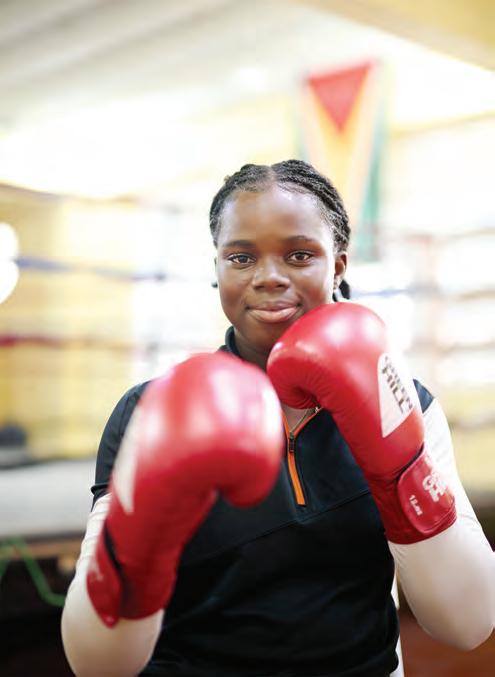
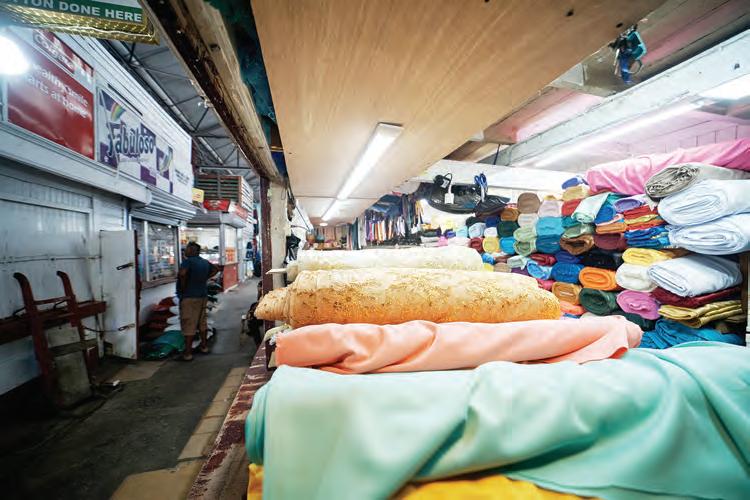
children, you gotta try to start life early,” she said. “If you don’t start life early, it’s not gonna work. Now I have my own children, and I’m trying to give them the life I never had.”
As someone who has endured hardship, Natasha has strong views on the struggles many women face, particularly in relationships. “For the past couple of years, a lot of violence is going on—especially with women,” she said. “Women have to
stand up for their rights now.” She believes too many women remain in abusive relationships because they feel they have no choice.
Natasha hopes to see more resources in Guyana for women facing abuse. “Women got to stop taking beatings from men and try to walk away,” she insisted. “But some women try to get out and can’t. They need to open something where a woman can go and express herself.” For
Natasha, leaving her marriage was a difficult but necessary decision. “I’m glad I got out,” she admitted. Through early marriage, heartbreak, and financial struggle, Natasha has proven that resilience is built thread by thread. From behind her fabric stall in Stabroek Market, she continues to push forward—not just for herself, but for her children and the future she hopes to give them.
Vanessa Elizabeth Williams-Rodriguez, and Vidya Ketwaroo.
Michelle A. Nicholas, the Founder/CEO of The NICO Consulting and Co-founder of the award, emphasised the core mission of the 25ILWA in her statement:
“T rue leadership is not about being the loudest voice in the room, but about empowering others to find their own voice and champion their unique potential.”
She further stated that:
“The 25ILWA is a testament to the power of collective strength, where these incredible women are not only recognised for their impact but celebrated as leaders shaping the future of Guyana. Through this shared commitment, we are igniting inspiration, fostering change, and setting new standards of excellence that resonate far beyond today.”
L yndell Danzie-Black, Managing Di rector of Cerulean Inc. and Co-founder of the Award, reflected on the significance of celebrating women during International Women’s Day, stating that:
“Women have been integral in shaping economies, advancing innovation, and nurturing communities, all w hile breaking down barriers in every sector. Yet, true progress remains elusive, as too many women still face systemic challenges such as gender-based violence, inequality, and limited opportunities.”
She further added that:
“In this spirit, I extend my heartfelt congratulations to the Awardees. Your dedication to leadership, excellence, and making a meaningful impact is inspiring. You are the role models who guide the way for future generations.”
The 25ILWA is not just an award—it is a movement that advocates for inclusivity, empowerment, and progress. Since its inception in 2019, the award has become an essential platform for highlighting women’s achievements and addressing the challenges they continue to face. Each year, the initiative has garnered significant recognition, with more nominations received, reflecting a growing momentum toward gen-
der equity.
To date, 125 women have been inducted into the 25ILWA network, an invaluable community that continues to support and empower women leaders across diverse sectors. This year’s honorees will join this esteemed network and will be eligible to apply for the Women’s Leadership Programme, which offers further opportunities for personal and professional growth, allowing them to amplify their impact in Guyana.
The 25ILWA’s anniversary gala promises to be a night of inspiration, celebration, and recognition. It will bring together key industry leaders, government officials, and corporate stakeholders in a collective effort to highlight the immense contributions of women in shaping Guyana’s future.
Organisations and businesses committed to gender equity are invited to join in supporting the 25ILWA through sponsorship opportunities. This provides an excellent chance for corporate entities to demonstrate their dedication to advancing women’s leadership and fostering an

inclusive future.
Tickets for the gala are available online via Eventbrite, and at various locations across Georgetown and Linden. For further details or to learn more about the 25ILWA, visit the official website or reach out via email.
In a joint statement to Pepperpot Magazine, Co-Creators of the 25ILWA, Michelle and Lyndell, shared that:
“The 25 Influential Women Leaders Award is more than a recognition—it is a powerful c atalyst for progress, unity, and lasting impact. Each year, we witness the unwavering
dedication, resilience, and influence of women who are not only shaping industries but also strengthening communities and inspiring future generations.
This year ’s honorees are expressing excitement in joining a movement of women leaders, and we observe that they embody the essence of leadership and collaboration, driving meaningful change that extends far beyond today.
As we celebrate their achievements, we remain committed to fostering a future where every woman has the opportunity to
lead, thrive, and create a legacy of excellence.”
The 25 Influential Women Leaders Award continues to build momentum and recognition for the women shaping the present and future of Guyana. As we continue to celebrate these honor ees, their collective journey serves as a reminder of the power of women’s leadership and the critical need for collaborative action to ensure equality, safety, and empowerment for women—not just in Guyana, but everywhere.


PHAGWA, or Holi, and Diwali are the two most ancient holy days celebrated in Guyana, with their provenance traced back to the late Bronze Age. This year, Phagwa will fall on Friday, 14th March. The festival
falls on a different date each year according to the solar calendar used in Guyana, as it is computed based on the lunar calendar. Similarly, all holy days in Islam and Christianity follow the lunar calendar and,
therefore, vary from year to year.
In Guyana, the festival is more commonly known as Phagwa, but globally, it is referred to as Holi. For the remainder of this article, we will use 'Holi.'

Holi, like all ancient festivals, has had various traditions attached to it as it traversed the centuries. The most ancient tradition of Holi's origin is likely as a Spring Festival. In the temperate zone, the transition from the cold, barren winter to the warmth and renewal of spring—a time of new life and abundance—has always been a cause for celebration in agricultural societies. Holi, with its
rituals of general house cleaning and sanitising, communal feasting, singing, dancing, and the joyful sprinkling of coloured water and powders, symbolises this renewal. It is a lso a time for making new friends and fostering unity among men and women alike.
Another tradition linked to Holi is the celebration of marital love, exemplified by Krishna and his consort, Rad -
ha. According to legend, Krishna asked his mother w hy he was so dark in complexion compared to Radha, who was very fair. His mother told him that differences in complexion were of no importance and playfully suggested that coloured powder could change Radha’s appearance. Krishna and Radha then joined in the Holi celebrations, spraying
TURN TO PAGE XI

FROM PAGE X
each other with different colours as an expression of love. The citizens, inspired by their example, adopted this practice as part of the festival.
The most important Holi tradition, however, is the story of Prahalad, which affirms the belief that good will always triumph over evil and that faith in God will protect the believer from all dangers.
Hiranyakashipu, the king of a northern Indian kingdom, practised severe austerities (tapasya) until he came to the notice of Lord Brahma, who sought to reward him. The king requested immortality, but Lord Brahma in -
formed him that this was impermissible. Instead, Hiranyakashipu asked for specific boons—he could not be killed by man or animal, neither at night nor during the day, nor on the earth or in the air. These boons were granted, and he became invincible.
However, this newfound power turned Hiranyakashipu into a tyrant. He declared himself to be God and demanded worship, outlawing devotion to Lord Vishnu. T hose who defied him faced death. His own son, Prince Prahalad, remained devoted to Lord Vishnu, refusing to worship his father. Enraged, Hiranyakashipu attempted to kill Prahalad multi-
ple times—throwing him off a cliff, into a well, into a cage with man-eating tigers, and among fierce cobras. Each time, Prahalad was miraculously saved. Even when given deadly poison, it turned to nectar in his mouth.
Hiranyakashipu’s sister, Holika, a witch, offered to help. She possessed a magical coat that protected the wearer from fire. She planned to take Prahalad onto her lap, sit on a pyre, and burn him alive while she remained unscathed. However, as the flames swirled, the coat was blown from Holika onto Prahalad, shielding him while she perished in the fire.

The following afternoon, a furious and demented Hiranyakashipu entered the temple where Prahalad was worshipping Lord Vishnu. Proclaiming himself God, he challenged Vishnu's omnipresence. When Prahalad insisted that God was everywhere, Hiranyakashipu struck a temple pillar with his sword, demanding, “If God is there, let him come out!”
At that moment, Lord Vishnu emerged from the pillar in the form of Narsingh, a Man-Lion
incarnation. A fierce battle ensued, culminating at the temple entrance at dusk. Narsingh seized Hiranyakashipu, sat down, placed him across his knees, and strangled him. In doing so, Vishnu fulfilled the conditions of the king’s death—he was slain by neither man nor animal, neither at night nor day (as it was dusk), and neither on the earth nor in space (as he was on Narsingh’s lap).
The citizens, overjoyed at the downfall of the tyrant and his wicked sister, Holika, celebrated
by burning effigies of Holika in bonfires. The following morning, in an eruption of joy, they engaged in feasting, singing, dancing, and sprinkling each other with coloured water and powders. This tradition has endured throughout Holi celebrations. In later centuries, these colours were st ylised into four main hues—red, green, blue, and gold—each carrying its own symbolism. And so, once again, we extend our heartfelt greetings to our readers—Holi Shubh!


WE are conditioned to protect ourselves and hardly expected to acknowledge that there are factors affecting other humans that we may seek to avoid. This may happen because the other person speaks to themselves and stares with an accusing frown, though you have not had an exchange with that person. Or perhaps, if you’re suspicious, the hostile thing
within them is angry with almost everyone—but you think it best not to ask why.
Less than a month ago, a plot with several homes was burnt down. Among the residents, there was a young lady who lived in a little cottage within the yard, suspected of paying no rent but adamant about staying sheltered. I know the brothers who grew up on that family plot. The
young man who related the incident to me lives there but is not related to the Wortmanville family. He was also a paying tenant when he told me about it.
That is not the first incident of its kind, I learned. While discussing the event at home, I was reminded by my other half that such an incident had occurred in Alberttown some years ago. The residents I knew had to get out. I am unsure
if that incident had any impact on the ailment that overtook a colleague of mine, who was the head of the household that had to flee the arson committed by another outraged young woman.
I am not sure that we have institutions that explore the impact of frustration and its extension into the nervous system, resulting in rage directed at the immediate world—the
one accused and blamed for whatever torment. The fact is that it seems someone or something must be blamed. A person defeated by imposed consequences or betrayal at some level naturally seeks solace and closure. Some may choose resistance in some form.
We dwell in a local world where consideration must be given to the fact that narcotics also play an important role in influenc-
ing behaviour. Some of our own people must be viewed seriously in this regard. The human mind, if driven by substances or personal perceived afflictions—whether the guilty party is perceived as an individual or society— may act towards self-destruction or against the perceived guilty Wherever or however it manifests, we all share that platform, too.



SOMETIMES, when I provide a patient with dentures, they call or return to the clinic, reporting that the dentures feel uncomfortable. When questioned, it is not pain, slackness, or anything tangible. The patient says, “Doc, it just feels uncomfortable.” Now, that is not abnormal.
New dentures may feel uncomfortable for a few weeks until you become accustomed to them. The dentures may even feel loose while the muscles of your cheek and tongue learn to keep them in
place. You may find that saliva flow temporarily increases. As your mouth becomes accustomed to the dentures, these problems should diminish.
Generally, one or more follow-up appointments with the dentist are needed after

a denture is inserted. If any problem persists, particularly irritation or soreness, be sure to consult your dentist.
Dentures can be made to closely resemble your natural teeth so that little change in appearance will be noticeable. In fact, they
are intended to improve the look of your smile and help fill out the appearance of your face and profile.
Eating with Dentures
Remember that eating will take a little practice. Start with soft foods cut into small
pieces. Chew slowly, using both sides of your mouth at the same time to prevent the dentures from tipping. As you become accustomed to chewing, gradually add other foods until you return to your regular diet. Continue to chew
TURN TO PAGE XV

food using both sides of the mouth simultaneously. Be cautious with hot or hard foods and sharp-edged bones or shells.
Speaking with Dentures
Pronouncing certain words may require practice. Reading aloud and repeating troublesome words will help. If your dentures “click” while you’re talking, try speaking more slowly.
You may find that your dentures occasionally slip when you laugh, cough, or smile.
Reposition the dentures by gently biting down and swallowing. If a speaking problem persists, consult your dentist.
Wearing and Caring for Dentures
Your dentist will provide instructions about how long dentures should be kept in place. During the first few days, you may be advised to wear them most of the time, including while you sleep. After the initial adjustment period, you will be instructed to remove the dentures before going to bed. This allows
gum tissue to rest and promotes oral health. Generally, it is not desirable for the tissues to be constantly covered by denture material.
Denture adhesive can provide additional retention for well-fitting dentures. A poorly fitting denture, which causes constant irritation over a long period, may contribute t o the development of sores. These dentures may need a reline or replacement. If your dentures begin to feel loose or cause discomfort, consult your dentist immediately

and Cleaning Dentures
Dentures are very delicate and may break if dropped even a few inches. When handling dentures, do so over a folded towel in case they fall from your hands. When you are not wearing them, store your dentures away from children and pets.
Like natural teeth, dentures must be brushed daily to remove food deposits and plaque. Brushing helps to prevent dentures from becoming permanently stained and helps maintain oral hygiene.
Unclean dentures can cause bad breath and gum infections. It is best to use a brush designed for cleaning dentures; however, a toothbrush with soft bristles can also be used. Avoid using hard-bristled brushes that can damage dentures.
Some denture wearers use hand soap or mild dishwashing liquid, which are both acceptable for cleaning dentures. Avoid u sing other powdered household cleaners or toothpaste, as they may be too abrasive. Also, avoid using bleach, as
this may whiten the pink portion of the denture. Your dentist can recommend a denture cleaner. The first step in cleaning dentures is to rinse away loose food particles thoroughly. Moisten the brush and apply denture cleanser. Brush every surface, scrubbing gently to avoid damage.
Dentures may lose their shape if they are allowed to dry out. When they are not being worn, dentures should be placed in a denture-cleansing soaking solution or in water.


STARTING a business can be a daunting task. After all, you’re invest-
ing your valuable time and mone y into a venture that could succeed or fail. The first step to succeeding in business is choosing the right
idea. Fr om there, you can develop the vision and structure of your

business, learn how to market your product or service and pay attention to both your customers and your competition. You want to make sales, but you also need to focus on the logistics of setting up your business, securing the funding you need, and understanding tax codes. In this comprehensive guide, Geary Reid offers essential information covering all these topics to help you set up your business for success.
1. Sourcing Financing
One of the biggest challenges start-up businesses face is access to financing. Many people have great ideas but lack the money to start a business, so their ideas remain in their minds or on the shelf.
People often complain that they want to start a business but are required to provide equity. The proportion of equity varies from bank to bank, and even the amount requested by the bank may be b eyond the reach of the business owner.
Since many owners of start-up businesses do not have the funds required, they must rely on external sources of financing. Unfortunately, responses from both individuals and financial institutions are not always encouraging.
1.1 Who can entrepreneurs borrow from?
The question of where to borrow from often arises. Owners of startup businesses frequently need additional financing, whether through savings or borrowing from financial institutions, so that
the bank assumes the risk of financing their business. Therefore, an ordinary person should not be afraid to seek financing. Never hesitate to seek financing if the need arises. Do not let your business idea die because you are afraid to ask. Borrowing is not a crime, but failing to repay a loan is.
Fa mily members and friends can be a valuable source of financing, especially if the amount needed is small and they support your business. It is always better to ask and be told no than to assume they will refuse. However, before considering borrowing money from someone, you must have a good relationship with them. Trust is key, and relationships should not be established overnight for the purpose of borrowing money.
Never ruin good relationships by failing to repay loans from friends and f amily. You never know when you may need to borrow from them again.
Many countries have small-business bureaus that assist entrepreneurs. These bureaus may offer guidance to small businesses, and since many new business owners lack financial management skills, small-business agencies can provide training and help them navigate the process. However, these lending agencies may have restrictions on financing a mounts, and their repayment periods may be shorter than those offered by commercial financial institutions.
Commercial financial institutions also provide

MONITORING is an important part of the management of the Iwokrama Forest. Did you know that wildlife can be used to check the impacts of our activities on the environment? Any wildlife that can be used to help signal ecosystem health is called BIOINDICATORS.
ANIMALS AS BIOIN-
DICATORS!
Understorey birds are used to monitor forest recovery in Iwokrama by comparing species present before and after logging. Our rangers also record waterfowls that feed on fish along the Essequibo River, as they indicate a healthy fish population. Fishes can act as bio -
indicators of water quality because of their ability to accumulate heavy metals in their muscle tissue. The toxicity is harmful for the long-term, as animals and humans feed on these fishes.
Amphibians are great bioindicators for climate change and environmental pollution due to their sensi-

tivity to chemical changes. Frogs and toads are sensitive to contamination that may result from agriculture and mining, which can lead to physical deformities. Mammals can be used to monitor environmental contamination and changes in habitats that occur due to human activities. At Iwokrama, we welcome
otter sightings as they signal that our waterways are clean and healthy. The sightings of top predators, for example, jaguars, indicate healthy populations of prey species in the Iwokrama Forest.
For More Info: Website: www.iwokrama.org
Email: iwokrama-general@iwokrama.org
Visit Iwokrama: tourism@iwokrama.org
In summary, wildlife are important indicators of ecosystem health because of their ability to respond to environmental stressors that occur due to human activities and climate change, making their conservation critical.



SHE did not sleep at all that night, the ache in her heart so deep it numbed her mind. She didn’t know what to think or how to process the shocking loss. The hours passed, and then she heard Mother Laila calling her name weakly.
Tina pulled herself together to attend to the old lady, and after giving her her medication, she sat with her for a long while.
“Ah had a bad dream,” she said.

“About what?”
She did not answer for a while, then said, her voice shaking a little, “Is Suraj.”
“What about him?” Tina asked in a quiet tone, a tinge of fear in her heart.
Mother Laila took a deep breath and squeezed Tina’s hand. “Don’t worry, meh chile, everything gon be okay.”
Tina went back to her room and, sitting on the bed, she wondered, What do I do now? Where do I go?
She knew she couldn’t stay at his home for too long because he had told her to move on. It was an unexpected setback in her life, plus she was worried for Mother Laila.
Who will take care of her?
The next morning, she tried not to let her worry show on her face and worked for several hours in the vegetable garden.
She was relaxing on the porch after lunch with Mother Laila, who was taking a light nap, when Suraj’s brother, Sunil, stopped by.
“How everything goin’?” he asked her.
She looked at him questioningly, not sure what he wanted to know.
“Yuh thought ‘bout leaving?”
She looked at Mother Laila, who was still napping and answered him, “Yeah, ah can’t stay hay fuh too long, but ah worried about leaving Motha Laila. Who gon take care of she?”
Sunil took a little while before responding.
“Ah ain’t think about that as yet. Ah gon talk with meh sisters. In de meanwhile, yuh can stay and continue tek care of she because yuh have nowhere else to go.”

LIKE stars scattered across the sky, our world is decorated by extraordinary talents and geniuses in every field imaginable. The collective light created by these brilliant individuals serves to illuminate the path to our future. It foretells what humanity can become and how it can change for the better. Yet, the more determinative factor in shaping our future is not merely the intelligence or skill of a select few but rather the inherent ability to grow and evolve that exists within every single person. After all, what use is a revolutionary idea or a profound new invention if no one is willing to change their lifestyle to adopt and use it?
Thus, the very future of humanity hinges on answering a rather strange question—Is it really true that a leopard cannot change its spots and a tiger cannot change its stripes?
Are human beings truly capable of change within a single lifetime, or is the process of evolution something that must unfold over several generations?
If people cannot change their opinions and adopt new ideologies during their lifetime, then it follows that each new generation bears the burden of catalysing societal change. This would mean that instead of being able to build upon a clean foundation, every new era begins with the task of discarding outdated beliefs, much like emptying a metaphorical trash can before growth can begin.
Perhaps we can better understand our ability to change by examining individuals from the past. One of the most influential figures in history was, of course, a German-born physicist with iconically eccentric white hair and a bushy moustache—Albert Einstein. Known for his groundbreak-
ing work in physics, Einstein has become a universal symbol of intelligence and the face of scientific discovery. Yet, his humanitarian side is not discussed nearly as often as it should be.
After leaving Germany and moving to America in 1933, Einstein was heartbroken to realise that African Americans were suffering under the Jim Crow laws in much the same way that Jews were being persecuted in Germany. Feeling a deep sense of kinship with those experiencing discrimination, he used his influence to speak out against racism and advocate for the rights of African Americans. This transformation in his worldview led to his famous quote in which he described racism as a disease—one he refused to remain silent about.
What makes this shift even more remarkable is that Einstein’s personal diary, which chronicled his travels in the 1920s, revealed that he had once held prejudicial sentiments himself. Yet, within the span of a decade, he not only corrected his own biases but actively fought against racism and oppression.
This proves that human beings can, in fact, grow and change within their own lifetime. While a leopard cannot change its spots, nor can a tiger change its stripes, a human being can transform through experience and knowledge. In truth, change is our very own speciality!
If there was room for growth in the heart of a renowned genius, then surely, there is space for us to evolve as a generation. One of Generation Z’s greatest concerns is the imperfect world being handed down by previous generations. However, the reality is that ‘previous generations’ are still present and actively shaping the world alongside us. With the right approach, we can create a united front against the social
ills that have plagued humanity for centuries—ills that have been passed down from
one generation to another, like unwanted heirlooms. So, the real question is
not whether humans can change but rather how we can ensure that they change
for the better while they still hold the world in their hands.






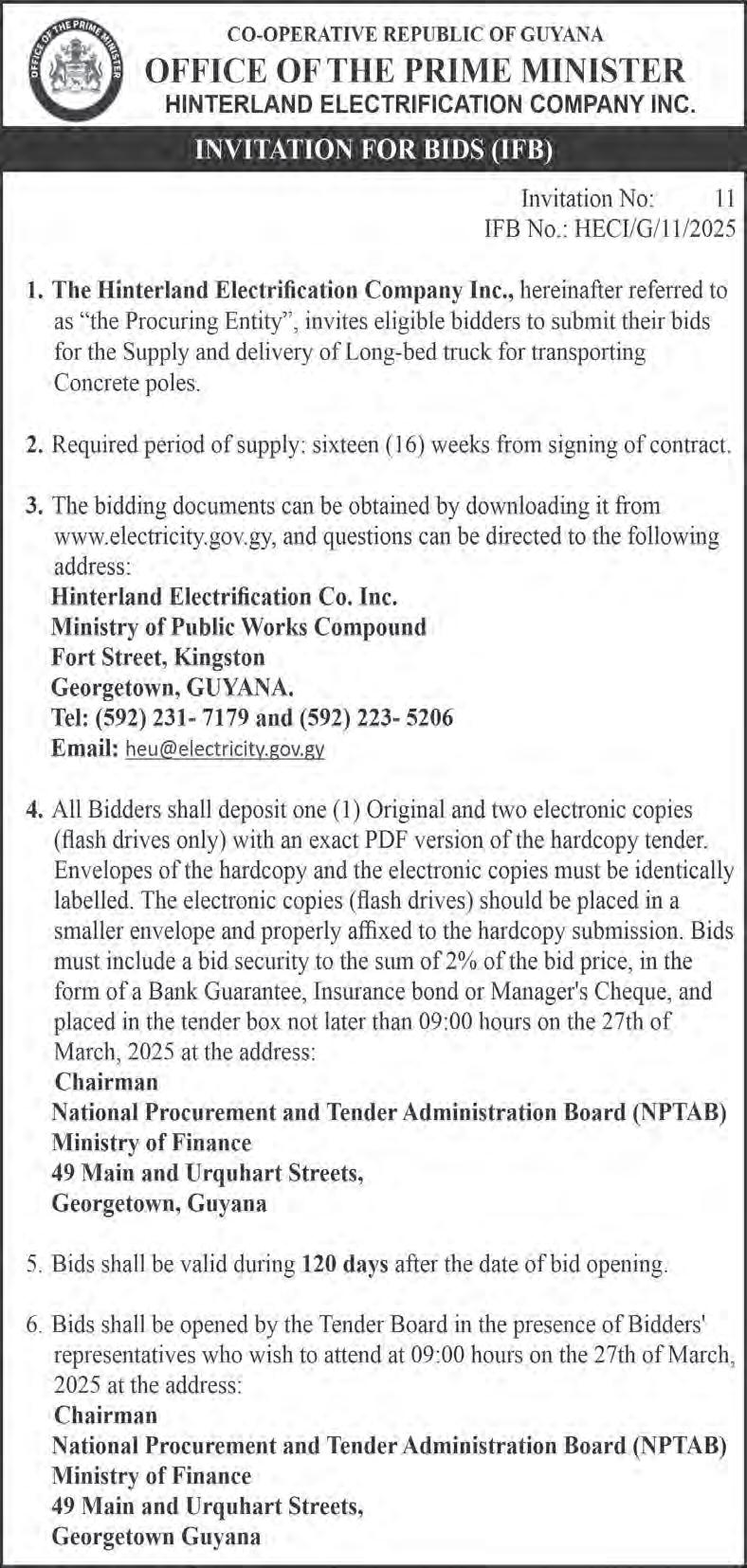






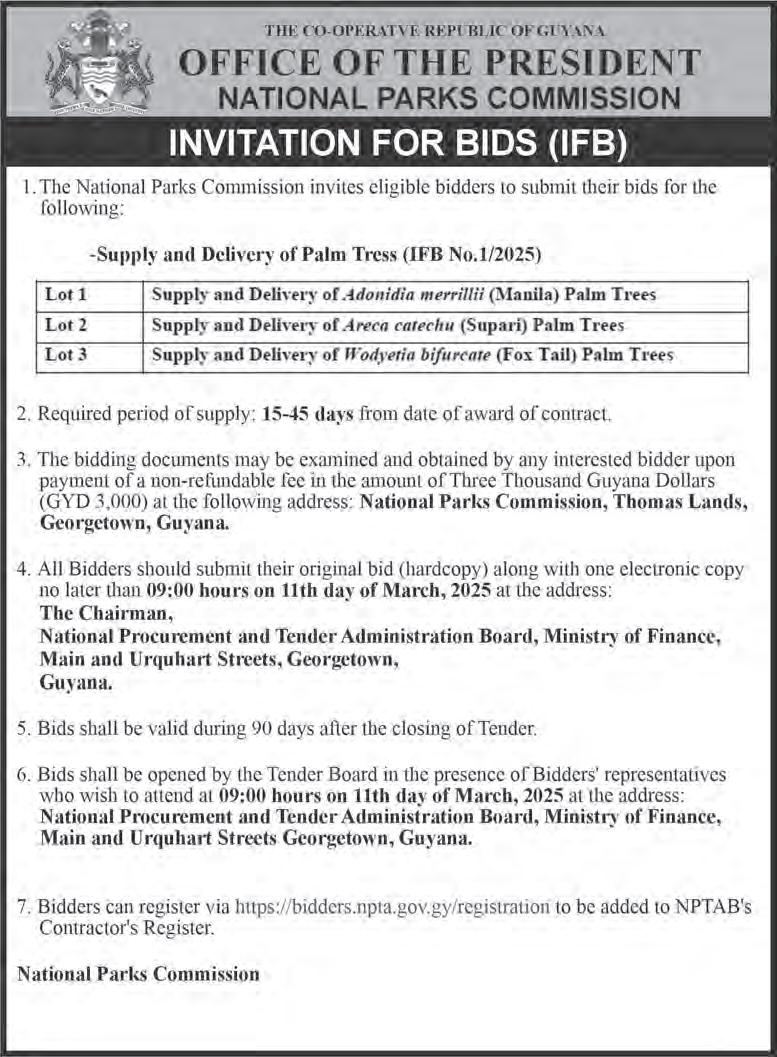

FROM PAGE XVIII
Tina smiled wryly at his blunt words but said nothing, knowing they would decide for her to stay only to take care of their mother.
“As much as ah care fuh Mother Laila,” Tina voiced to herself, “and ah feel sorry fuh she because she own children neglecting her, ah have mi life tuh live. Suraj done move on, and I have to tuh.”
As she continued her vegetable garden business, she made inquiries for a room or small apartment to rent. She also scoured job opportunities, but though there were several for maids and salesgirls, the pay was not so good.
“Ah think going into a small business would be ah betta option,” she opined. “But ah would need investment.”
She sighed with a measure of frustration, but she knew she couldn’t give up.
“Ah muss stay strong. Ah muss mek something of dis life then show Suraj ah can be somebody.”
It really hurt her that after two years of using her and betraying her trust, he had moved on with someone else, not caring what happened to her.
Upon returning one day after searching for a place to rent, she saw Mother Laila sitting in the rocking chair on the porch.
“Sorry ah late.”
“Is okay, ah fine, and is a fine day.”
Tina looked at her, a little surprised. The old lady, battling health issues, always had a dull outlook.
“Yuh seem to be in a good mood.”
“Yes,” she smiled a little. “How was yuh day?”
Tina sighed. “Nah so good.”
“Yuh ah wan good gyal,” Mother Laila expressed, “and something good guh happen fuh yuh.”
“Wish ah could believe dat,” Tina said quietly. That night, since she had read Suraj’s letter, she had a good night’s sleep, for she was worn and tired. The next morning, after breakfast, Mother Laila came out of her room, nicely dressed and walking steadier than usual with her walking stick.
“Hello,” Tina said, surprised. “Wey yuh going?”
“Ah going tuh see ah old friend,” she answered.
“Is somebody taking yuh?”
“Yes, he daughta coming fuh me.”
“Okay. Nice tuh see yuh doing betta.”
Mother Laila’s daughter came by later to see her and inquired about Tina whom she had gone to visit, but Tina couldn’t tell them because she didn’t know herself. They waited for a short while, then grumbled and left without a word on who would be taking care of their mother. They had been visiting her often to pressure her into changing her will since Suraj wouldn’t be coming back.
Tina never heard from Suraj again, and six months after his letter, when she felt she had saved enough money to move on with her life, Mother Laila died.
It left Tina devastated because she had such a close bond with the old lady and had done the best she could for her.
The night before, after giving her her medication, she had sat with her until she fell asleep, grieving that she had to leave her. As she got up to leave, Mother Laila opened her eyes and said in a bare whisper, “Ah sorry what muh son do tuh yuh, yuh deserve betta.”
Suraj did not come to his mother’s funeral, and when he called live during the service, Tina did not speak to him, too overwhelmed with emotion for Mother Laila.
Two weeks later, Sunil and his sisters told her, “Yuh free now to leave suh we can take control of de house and put it up for sale.”
Tina had nodded, knowing she had to leave, but she felt a bleeding pain in her heart at their words. It was a home where they were born and raised, a home with such precious memories of their mother, but all they cared about was money.
But Mother Laila left a shocker when the will was read.
To be continued…
FROM PAGE XVI
loans for businesses and individuals. However, borrowing requirements from commercial institutions are often stricter, particularly for first-time borrowers. Interest rates charged by commercial banks are typically higher than those from small-business agencies.
1.2 How much should entrepreneurs borrow?
Borrowing can be intimidating, and many entrepreneurs are unsure how much to request. Typically, the amount provided by a lending agency matches the estimates or budget submitted. Therefore, it is essential to clearly state the amount required to establish the business, along with funds to cover a few months of operations.
If you have extra funds available, you may use them as a financial cushion for the business and avoid borrowing additional money. However, borrowed funds must be used strictly for their intended purpose. Some individuals are eager to borrow but end up using the funds for reasons unrelated to their business. When borrowing, request an amount you are comfortable repaying. Do not take out a loan simply because a financial institution is willing to provide the funds. Lending institutions may offer large sums because they benefit from interest payments, but borrowing more than you need can lead to repayment difficulties and, ultimately, put your business at risk.
1.3 When should entrepreneurs borrow?
Timing is a crucial factor in borrowing since interest is calculated from the date the loan is issued. If money is borrowed too early but remains unused, the borrower may need to use part of the principal to repay the loan. Ideally, positive cash flow from the business—not the loan itself—should be used to make repayments.
If funds can be borrowed and put to use immediately, that is a good strategy. Money should not sit idle, as interest accrues daily and can create financial strain for the borrower.
1.4 What is the payback period?
Before taking a loan, entrepreneurs must determine a reasonable payback period. Financial institutions often suggest repayment timelines, but business owners should carefully assess whether the proposed period is feasible.
Some lending institutions have fixed repayment schedules that cannot be adjusted. In such cases, business owners must ensure they can meet the repayment obligations within the given timeframe.
Shorter repayment periods can be challenging, especially if the business does not generate sufficient cash inflows quickly. However, at the same interest rate, a shorter repayment period results in lower overall interest costs, making the loan less expensive in the long run.
For more information about Geary Reid and his books, visit:
�� Amazon: http: //www.amazon.com/author/ gearyreid
�� Website: www.reidnlearn.com
�� Facebook: ReidnLearn
�� Email: info@reidnlearn.com
�� Mobile #: +592-645-2240
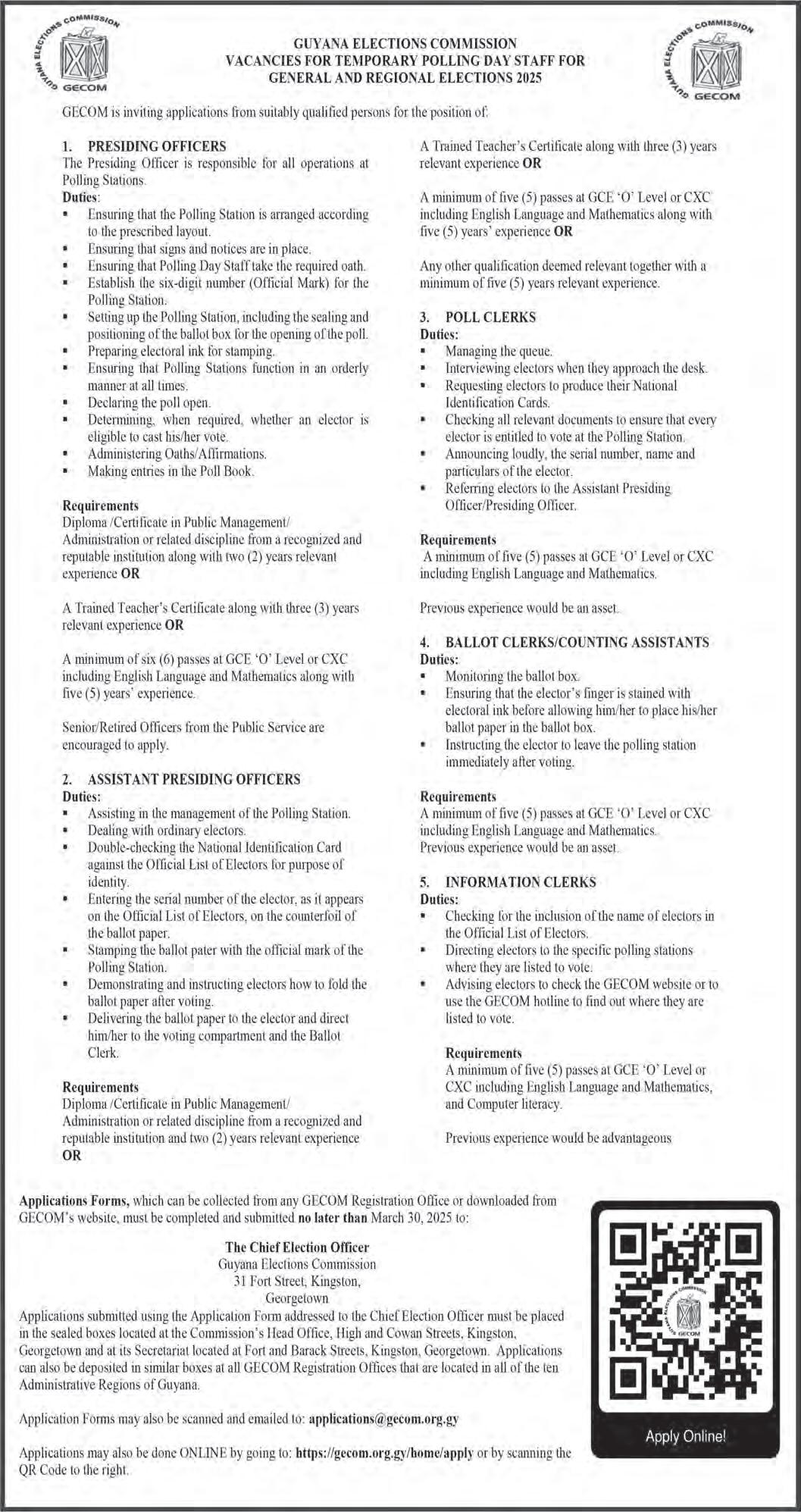

THE word relapse carries a strong negative connotation. Many argue that it should now be referred to as reoccurrence due to its commonality and its role in progress
and learning. It is often, understandably, viewed as a failure, but actual progress and meaningful growth are impossible without occasional setbacks.
Today, we reach the final stage of making intentional change: Relapse. We have covered the first five stages of intentional change, and by now, these changes should feel
easier. However, where there is change, there are setbacks. They can occur soon after progress begins or many years later; they may happen once or countless times.

When we decide to change and take progressive steps forward, it can be disappointing when old thoughts and behaviours resurface. Do not be discouraged by temptations, cravings, or urges; they are an inevitable part of life. A setback is simply an opportunity to reflect on our efforts, commitment, discouragement, and all other experiences that build resilience and wisdom. It is an opportunity for self-awareness, humility, and compassion, reminding us that clarity and confusion are both natural parts of the journey.
We are meant to go through these rollercoaster cycles. The cliché “you can’t have the highs without the lows” is well known for a reason. You won’t understand motivation without experiencing unproductivity; you won’t appreciate enthusiasm without feeling indifference, and you cannot truly know success without having faced failure.
While we should not fear our setbacks, we should not encourage them either. There are preventative measures that can reduce the likelihood of relapse.
Be aware of your emotional states that act as triggers. One can only be prepared to the extent of their awareness. Ask yourself: Are you more likely to have setbacks when feeling sad? Angry? Understanding these emotional triggers allows for better preparation and relapse prevention.
Focus on creating new habits instead of eliminating old ones. A simple mindset shift can make all the difference. When new habits are introduced, old ones naturally dissolve over time. For example, if you want to replace your daily snack of cookies with apples, it may seem difficult to resist the cookies. However, if you focus on introducing apples rather than removing cookies, your mindset shifts. Additionally, replacing old habits with new ones is crucial—elimination without substitution often creates a void that makes relapse more likely.
Recognise the deeper purpose of bad habits. A single habit can serve multiple functions. If your afternoon cookie is both a snack and a source of emotional comfort, replacing it with an apple may satisfy
hunger but not the comfort aspect. This can lead to relapse. If we don’t address the underlying purpose of our bad h abits, healthier alternatives will struggle to take root. Instead of simply judging or rejecting your bad habits, ask yourself: What need does this habit fulfil? If there is an urge to revert, it may indicate an overlooked need.
If you fall back into bad habits, always keep the new habits going. For example, if you have decided to replace social media scrolling with reading a book and fall back into scrolling, keep up the reading as you are still strengthening the new habit, which you will return to, and not from zero. Keeping up the reading will ensure that if you must ‘start over’, you will do so at 30%, and the next time will be 40%, the time after that 50% until the old habit falls short and the new habit becomes ingrained.
Never make the mistake of minimising the impact of the behaviour, even once. If you are trying to lower substances and you know that cigarettes cause you to crave alcohol, thinking “one won’t hurt” can be detrimental. Self-awareness of impact is crucial to avoiding reoccurrences.
When we fall back into bad habits, we also tend to fall into negative thought patterns, trapping us in a negative loop. Be careful with negative thought processes and self-labels. You aren’t weak or lazy if you aren’t able to achieve it all the way you want.
Replace feelings of shame and guilt with curiosity. There is zero advantage to feeling bad about yourself, but there is pure benefit in questioning why it happened.
If you have fallen into old patterns, the most important thing is to reframe it. It’s not a failure; it’s a learning opportunity on what triggers are strongest and which coping strategies are weakest. Always be kind to the unkindest parts and views of yourself. The fact that there is even an attempt at self-improvement means you have self-worth. It takes anywhere between 40 to 60 days to form new habits; you must be patient when becoming something you weren’t before.























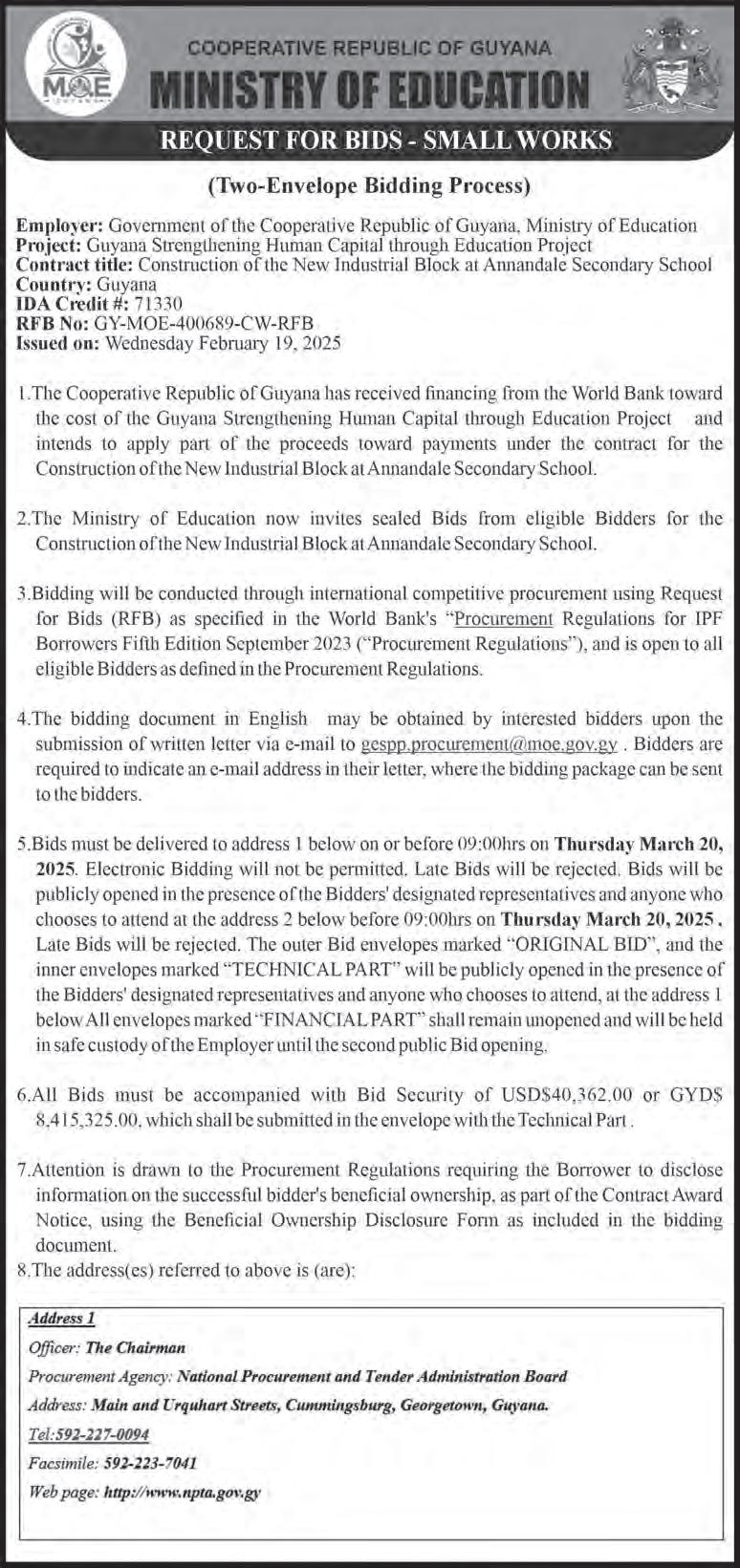










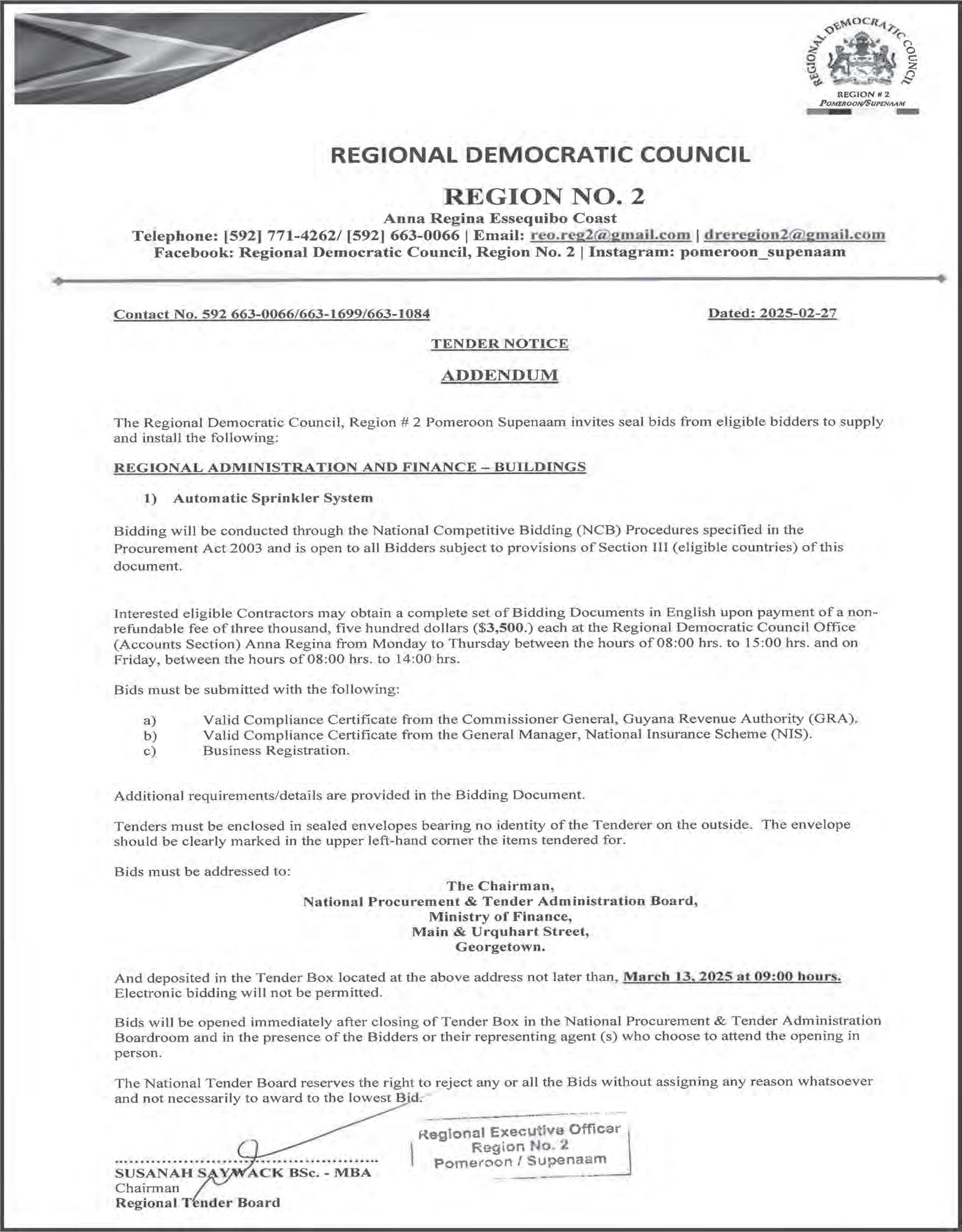
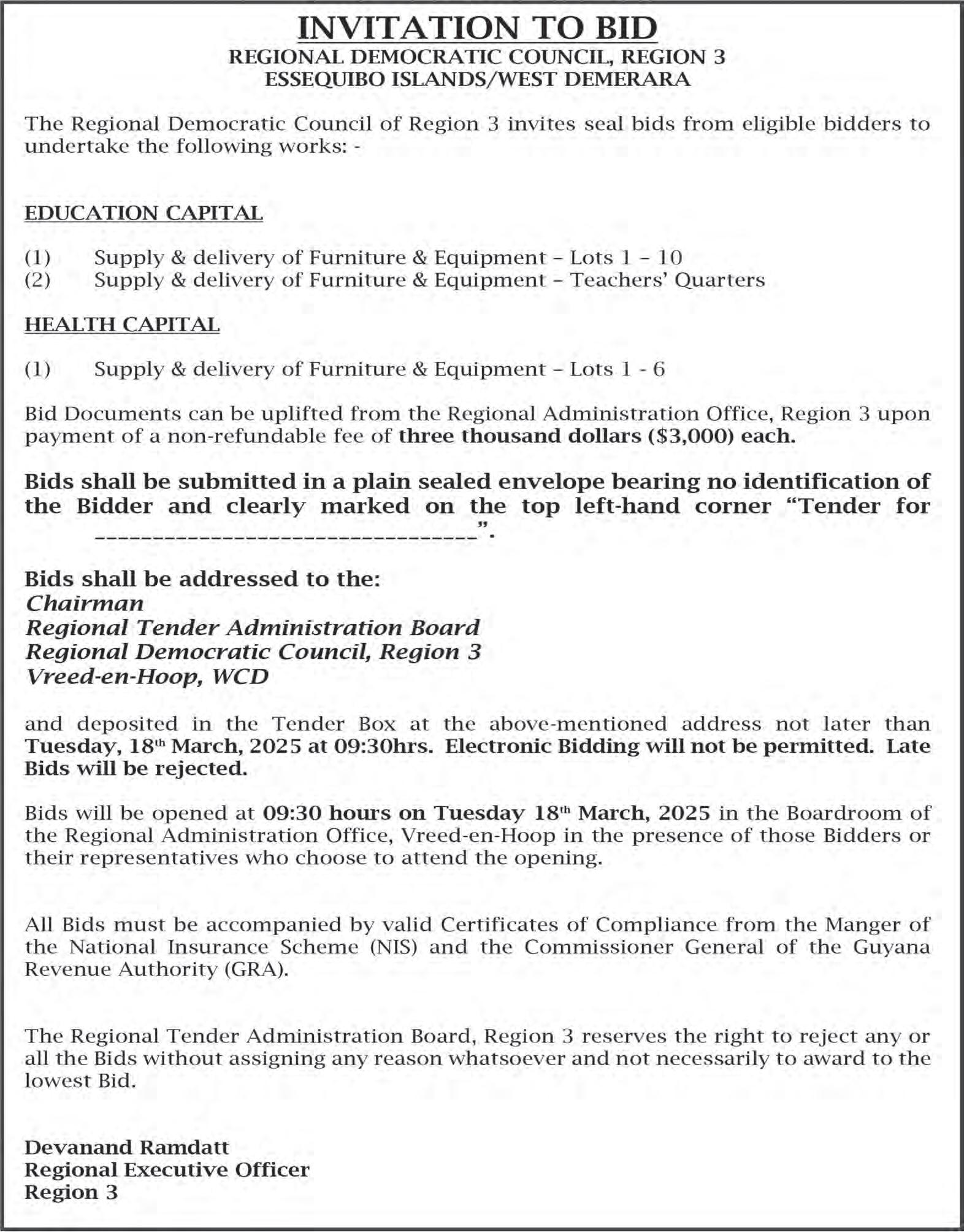

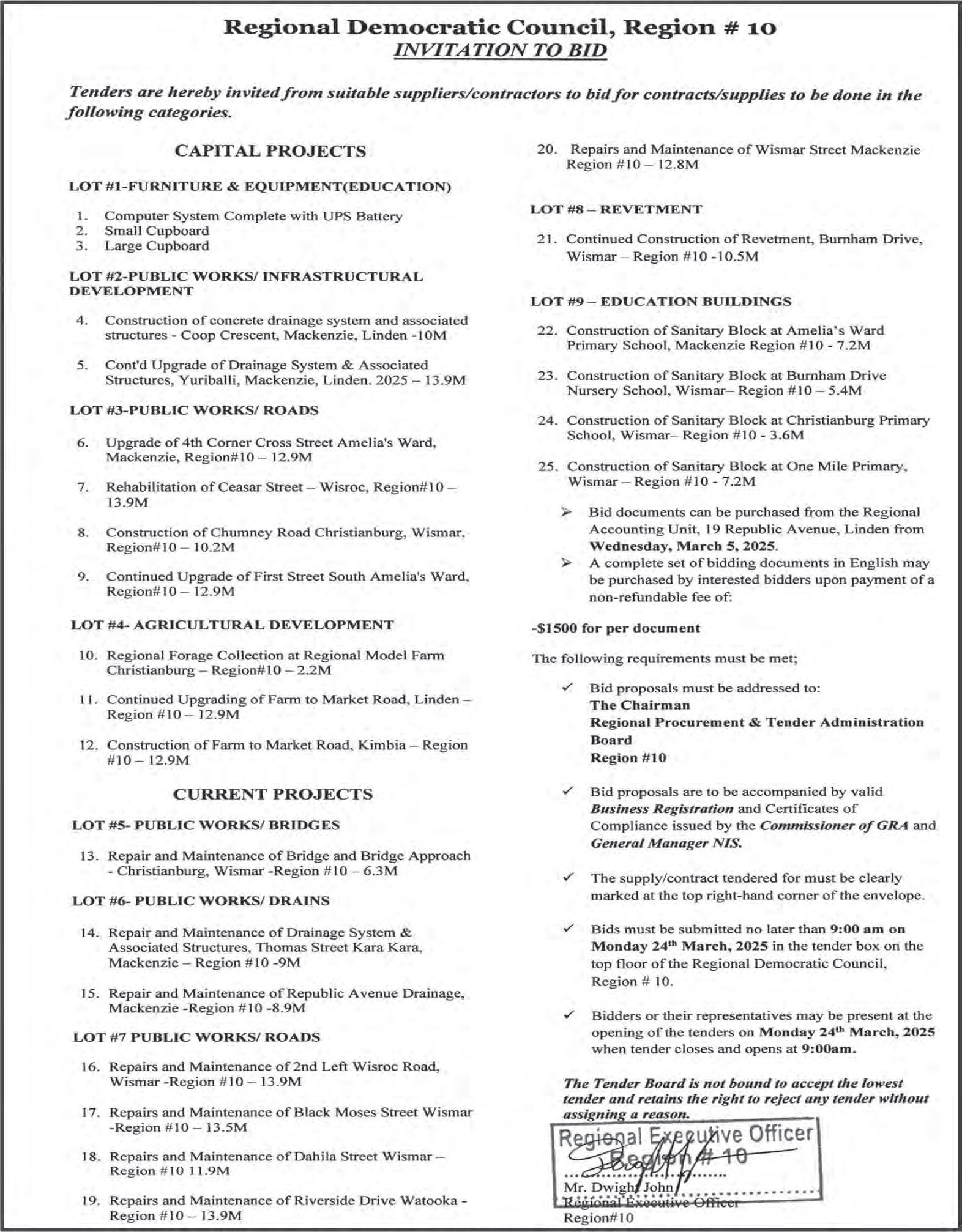


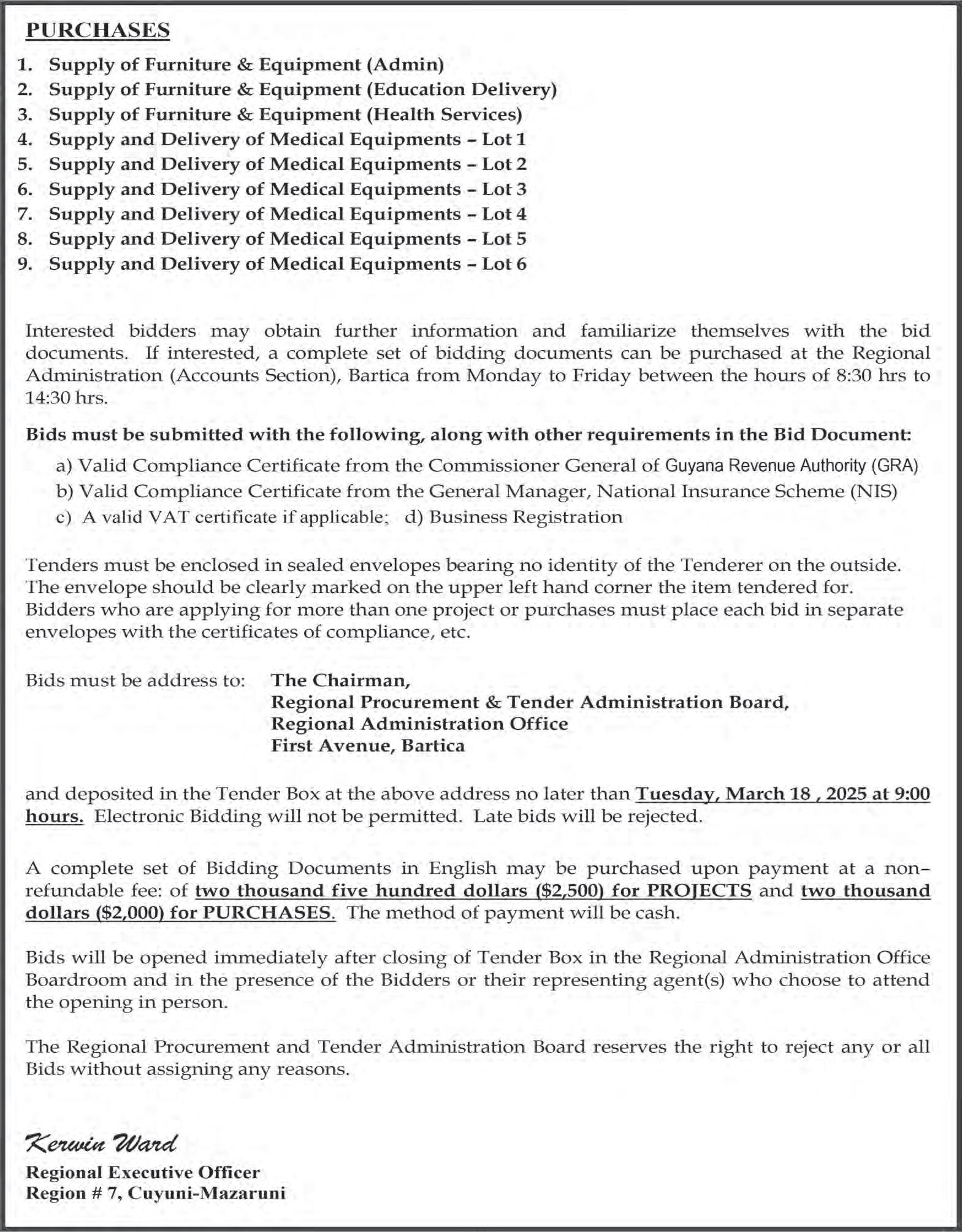



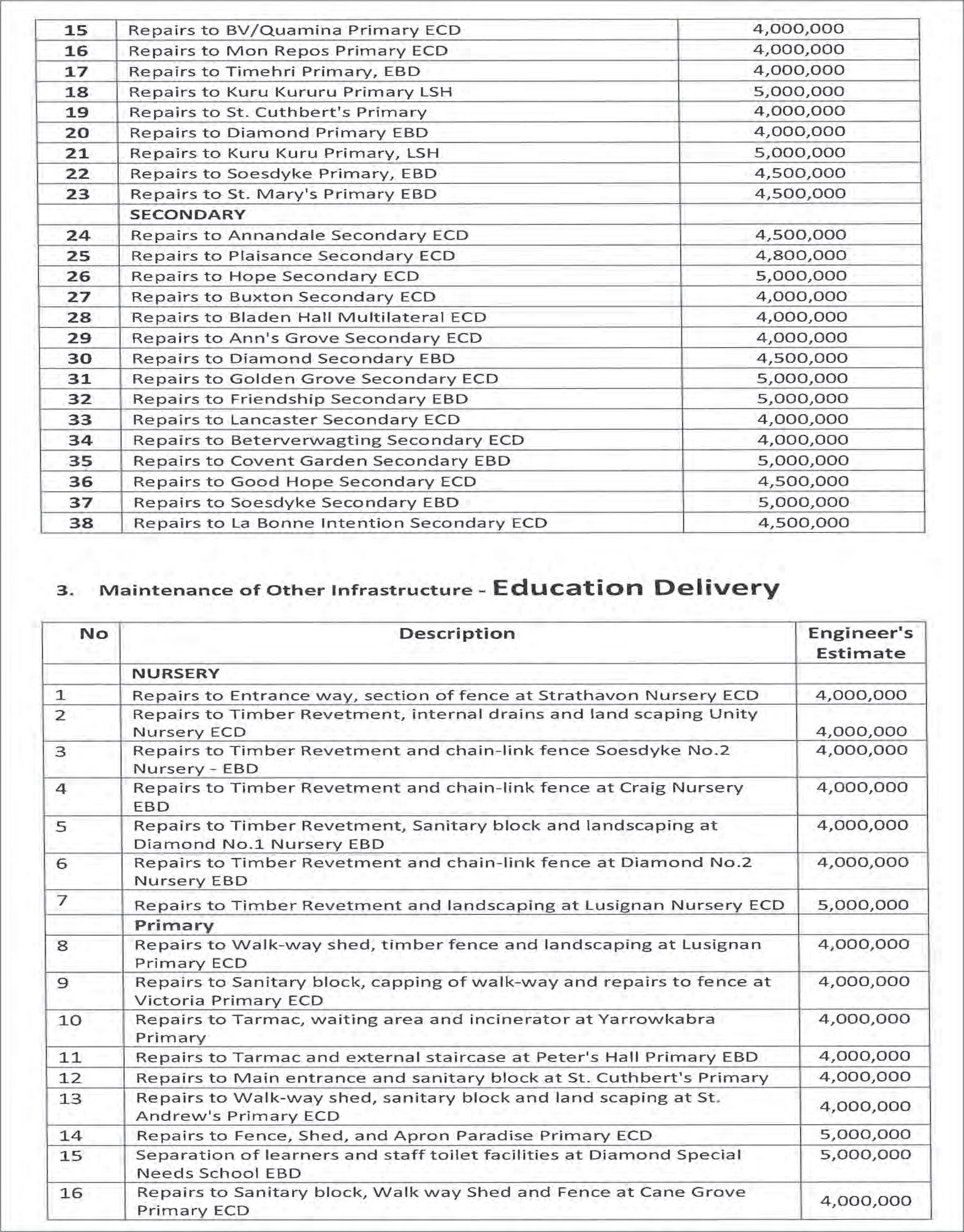
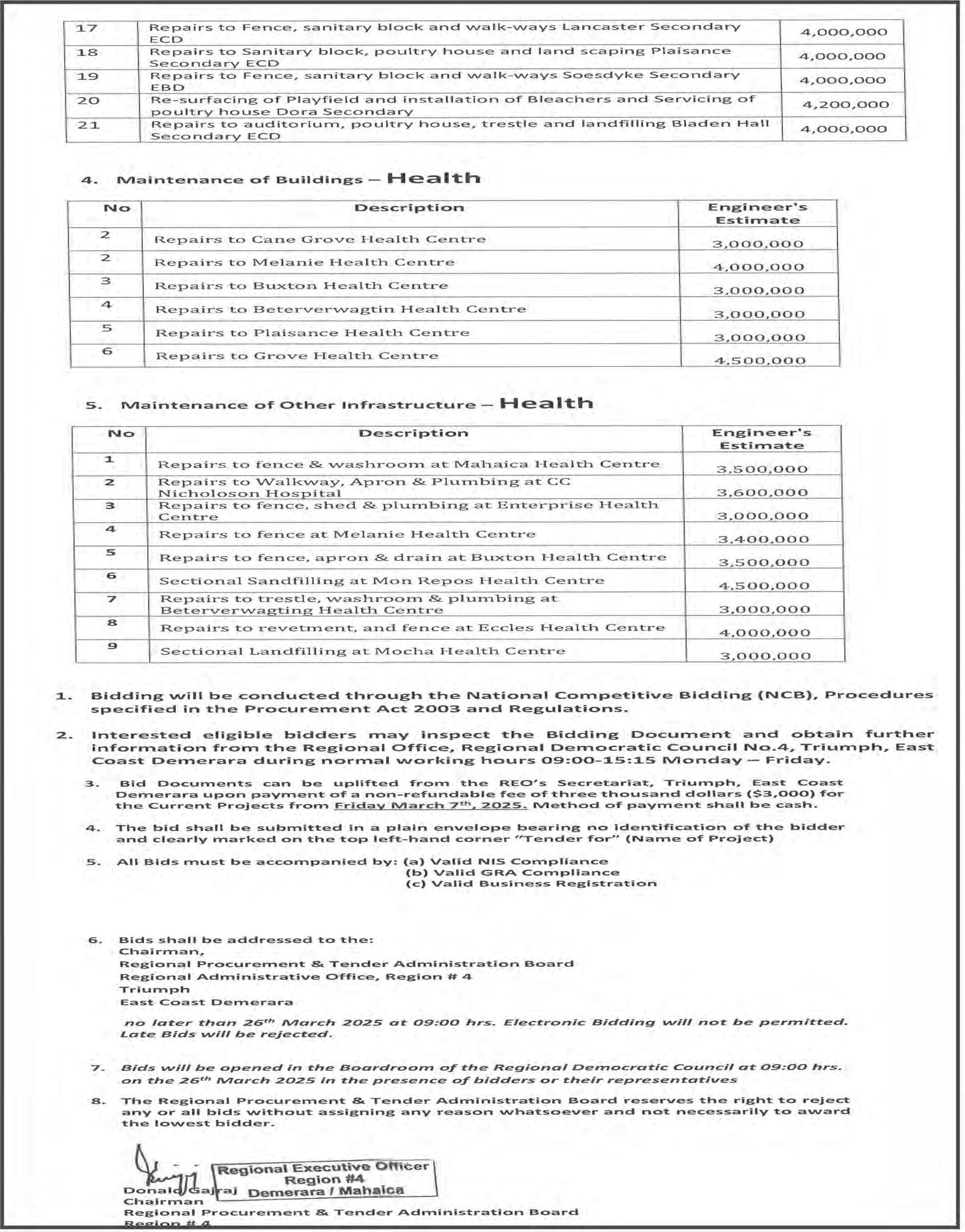
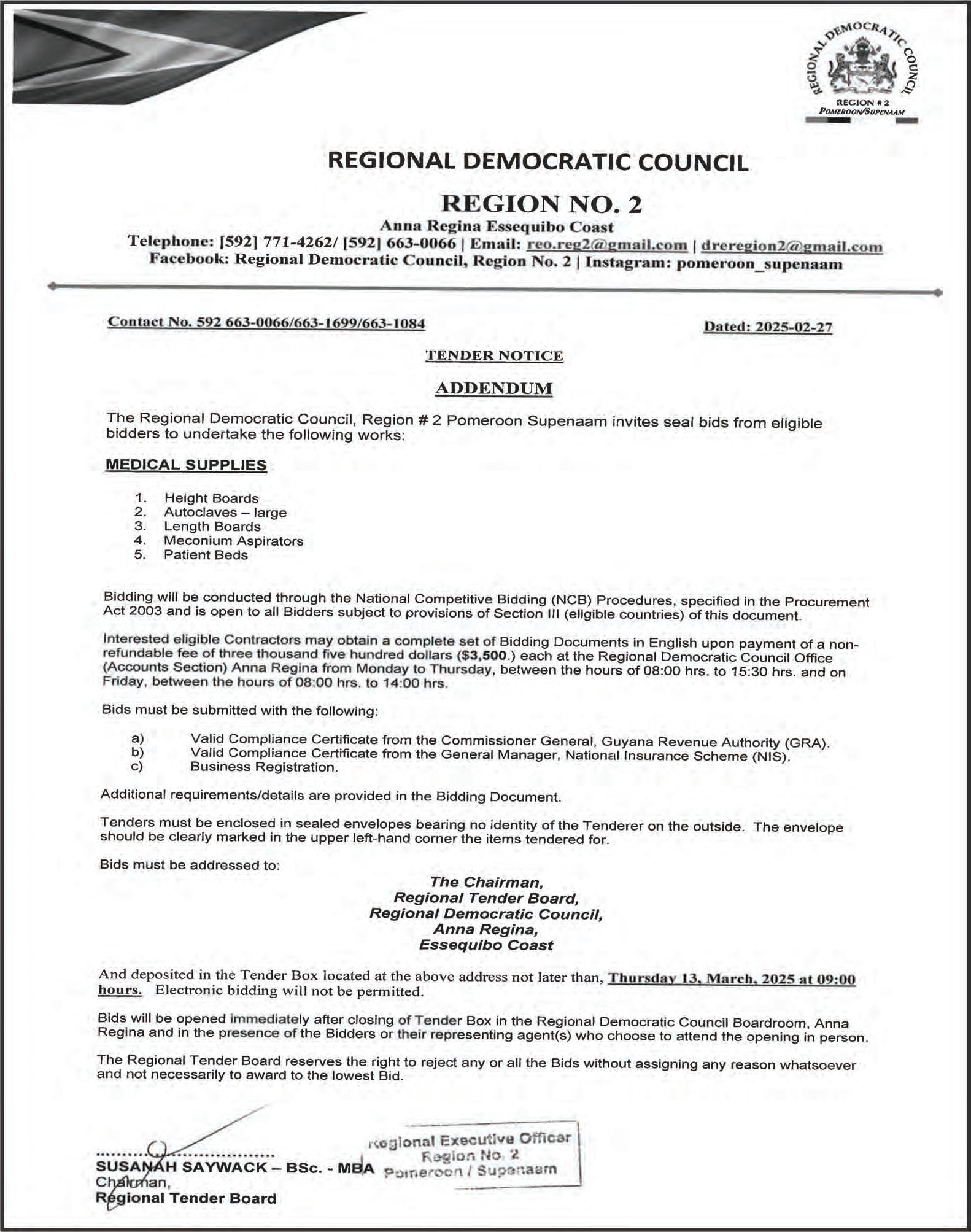

STUDY SUCCESS
Dear Student, Welcome, dear reading friend. The short story is a form of narrative writing with all the elements as novels. So, rightly edit your product for plot, character development, point of view, story structure, theme, conflict, and setting to maintain story excellence. Why not begin close to the end? Let that
young foreign, coconut estate heir’s story start where she sees the estate firsthand and then reacts horrified. Build up the backstory through writing tools like dialogue, flashbacks, and protagonist’s action. Be wise.
Love you.
THE PASSAGE
Understanding relations between parts of the passage
Directions: Read the fol-
lowing passage carefully and then answer the questions that follow.
The throw-away spirit or the spirit of wastefulness has become part of American life and consumption only keeps rising. Besides, according to the economists, we depend so much on this wasting and buying that people will probably be encouraged to consume even more in the years to come if the U.S. economy

March 9, 2025
is to prosper. In other words, these marketing experts say that “the average citizen will have to step up his buying by nearly fifty per cent in the next dozen years, or the economy will sicken.” This means that the producer of household commodities, i.e. a television manufacturer, will have to find some new means of making further sales since nine out of ten American homes nowadays have one television set. He could, for instance, launch a campaign to induce people to have a second TV set – or one for each member of the family – or he could produce a TV set so sophisticated that people would wish to replace their old set.
(Vance Packard’s “The Waste Makers”)
1. Give the meaning of each of the following terms used in the passage: throw-away spirit, part of American life, the economy will sicken, a TV set so sophisticated.
2. Has the writer used a word or marker of equivalence to introduce an example? Give a word that introduces an example.
3. Has he rephrased something that has been said before? Give a word that marks a rephrasing? State the rephrasing.
4. What general word does the writer use to cover the phrase “producer of household commodities”?
5. The general word “economist” is used by the writer to cover the phrase “marketing expert.” In what way do these two relate?
6. Pick a way of life in your school or classroom or family and write cogently about it in not more than150 words.
GRAMMAR
A. Revision of the usage of quotation marks
Note: Punctuation marks are signals that help the speaker interpret a message correctly. Quotation marks, for example, tell the reader, “These are the exact words spoken or written by a person.” Quotation marks have various uses, some of which are highlighted today.
See how the comma is used to introduce the quotation or to follow it? Well, the comma works with quo-
Better by far you should forget and smile Than that you should remember and be sad. CHRISTINA ROSSETTI (1830-1894) Remember
tation marks to separate the quotation from the rest of the sentence.
When you become advanced in writing, like what journalists do, you will find that at times exactness forces you to even repeat any errors in spelling, grammar, or punctuation, or fact that appear in the original quotation. In such cases, use the word ‘sic’ to denote the error by placing it right after the mistake. [In print, ‘sic’ is put in italics.]
Let us now examine specific examples of the appropriate use of quotation marks.
Terms and Expressions: Writers use quotation marks to give special significance to certain terms and expressions such as for i) explanations and definitions, ii) for unfamiliar terms, iii) for slang and humorous expressions, and iv) for translations of foreign words.
1. Explanations and Definitions: Use quotation marks when expressions are introduced by ‘so-called’; ‘marked’; ‘entitled’; and ‘signed’.
a. The Beacon’s “express service” delayed the delivery of the letter by at least ten days!
b. Simone, please be sure to mark these cartons “Right Side Up: Printers.”
c. The abbreviation ‘cps’ means “characters per second” and refers to the speed with which a word processor or a device or software programme creates, stores, and prints text documents.
2. Unfamiliar Terms: Technical terms and other terms that may be unfamiliar to the reader are generally placed in quotation marks.
a) Whichever model you choose, you will enjoy superb performance of our “EFT” engine. (electronic fuel injection)
3. Slang and Humorous Expressions: Enclose these in quotation marks.
a) The writer predicted that within the next 10 years more of today’s old-fashioned agricultural machines would “bite the dust.”
b) When Sandra was asked for the group report, she told us “ain’t ready yet!” (The deliberate grammatical error is intended to be humorous.)
4. Translations: Foreign words and phrases are set in italics in print.
Thomas did not know that moi, mes, ma mean “my, mine.”
B. Positioning punctuation at the end of quotations
The positioning of other punctuation marks inside or outside the ending quotation mark sometimes causes confusion. Yet the rules governing such cases are few and easy to understand. Pay attention as you are reminded of the following three principles. 1. Periods and Commas. Always place periods and commas INSIDE the second quotation mark. 2. Colons and Semicolons. Always place colons and semicolons OUTSIDE the second quotation mark. 3. Question marks and Exclamation points. If the words within quotations make up a question or an exclamation, then the question mark or exclamation point belongs with those words – that is, it belongs INSIDE the second quotation mark.
Something to Do: Correct any errors in the use of quotation marks in the following sentences. Write OK if there are no errors.
1. Did Henry say he will be leaving “immediately after breakfast”? 2. Mrs. B. Quintyn asked, “Does anyone have a copy of the most recent chart of teenage pregnancy rates in the Caribbean”? 3. As soon as she saw the new mother, Mrs. Washington, Mavis cried out “Congratulations!”

GUYANA’S discovery of oil has catapulted infrastructural developments and urbanisation in recent years. Public transportation is an essential means of commuting for students and the working class every day. The current state of our public transportation system in Guyana needs addressing because many citizens are unable to afford their own transportation, such as cars. While public transportation is a necessity, improvements to it can further boost our tourism and economic development.
Currently, our public transportation is synonymous with overcrowded, noisy, and poorly maintained minibuses in many parts of Guyana. There are certain taxi services, but these are primarily available in the city areas or towns. As a result, transportation in rural areas can be very costly, as most people depend on private transport. The buses can also be unsafe due to speeding and a lack of regulations. Due to an increase in privately-owned transportation a nd road construction, there is now congestion on roads, especially on the East Bank and East Coast highways. This makes public transportation less reliable, with no estimated departure or arrival times expected. While the establishment of structured and regulated public trans -
portation will assist in mobility, it will also support our efforts to reduce the ef fects of climate change. When there are reliable modes of transportation in cities and towns, many people will opt out of using their own cars. This will ultimately decrease gas emissions, improving our air quality. Guyana also deserves an interconnected system that is reliable and traceable. Most modern cities utilise mobile apps and schedules to ensure that public transportation operates efficiently. Al l modes of transportation, such as buses, water taxis, and even a train system, should be interconnected to avoid delays.
In certain cities, the simplest mode of transportation—a bicycle— is also given priority with a designated lane. Perhaps, since Guyana already has many e-bikes and bicycles, there should be a dedicated lane to ensure the safety of those users. I ur ge the government to invest in these key infrastructural and transportation developments. I long for the day when public transportation between Berbice and Georgetown i s no longer tiresome and hassling. I also look forward to seeing more developments for rural communities, especially those in the interiors of Guyana. While the thick forested land -
scape poses challenges for these developments, over time, I hope we overcome them to ensure the interconnectiv-
ity of our country. Due to the lack of access, Guyana can often feel geographically disconnected. I hope that we
r esolve this with the help of public-private partnerships. As we propel further in development, I hope we
e xpand these conversations to ensure that we prepare for all the opportunities our country’s future holds.

